




















































ISSUE 39 — HEART SPRING 2023
You might be wondering who the person on our cover is. at noble side pro le doesn’t look much like the whiskered King of Hearts who ordinarily graces playing cards. No, this king is the Italian poet Dante Alighieri, whose epic poem, e Divine Comedy, has been studied and enjoyed since the Middle Ages. At the opening of Inferno, or hell, Dante describes his heart as being like a lake, a reference to the vast and sometimes complex landscape at our physical core. In fact the word “cuore” in Italian means heart but also emotion, or spirit. e idea of a lake of spirit summed up our feelings about the role of a heart, which is functional, but also wildly literal in the way it moves emotion through us.
As always, thank you to everyone who took the time to submit writing to us. Your poems and stories have shown me how powerful and varied our associations are with this particular word, whether you’re describing an organ that beats to keep us alive, the centre of something or a rather kitsch pink shape. e best writing revealed the heart’s mysterious control over us, and the resulting drama when our hearts are in con ict with our rationality.
e romantics among you will enjoy Cupid by Skye Fulcher (page 8); while anyone burned by a relationship or unsure of their standing in the heart of their lover might want to look at e Inner Chamber by Lauren Woods (page 30). We are fortunate to have an extract from our guest author Kevin Jared Hosein’s novel Hungry Ghosts among these pages (page 20). Kevin, who is from Trinidad and Tobago, has published two previous books and won the Commonwealth Short Story Prize in 2018. His latest novel explores what happens when a person at the heart of a small community vanishes. ank you for reading, and we hope you’ll nd something that speaks to your heart here.
Popshot Quarterly is the illustrated magazine of new writing, providing a publishing platform for the best emerging talent. popshotpopshot.com hello@popshotpopshot.com
Facebook, Twitter Instagram and Pinterest @popshotmag
ISSN: 2041-4382
Cover illustration by: Chiara Morra chiaramorra.com
Editor: Matilda Battersby Art Editor: Andrea Lynch
Publisher: Simon Temlett

Subscriptions: CDS Global +44 (0)1858 438816 popshotpopshot.com/ subscribe
Published by: Chelsea Magazine Company Ltd chelseamagazines.com
Distributed by: Seymour Distribution
Matilda Battersby — EditorPrinted in the UK by: William Gibbons
50 Neil Laurenson
FIRST DATE Illustration by Katie Coward 56
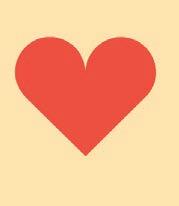
Suzy Aspell HEART AS SNOWSHOE HARE Illustration by Ginger Ngo 62
Emmaline O’Dowd CHINESE JAR Illustration by Milena Muszynska 69 Ciarán Parkes HEARTSEASE Flash Fiction 8
Skye Fulcher CUPID Illustration by Tímea Terenyei 18 Reema Rao-Patel HER TWINN Illustration by Tim Alexander 38 Emma Robertson THE PICKUP ARTIST Illustration by Catherine Byun


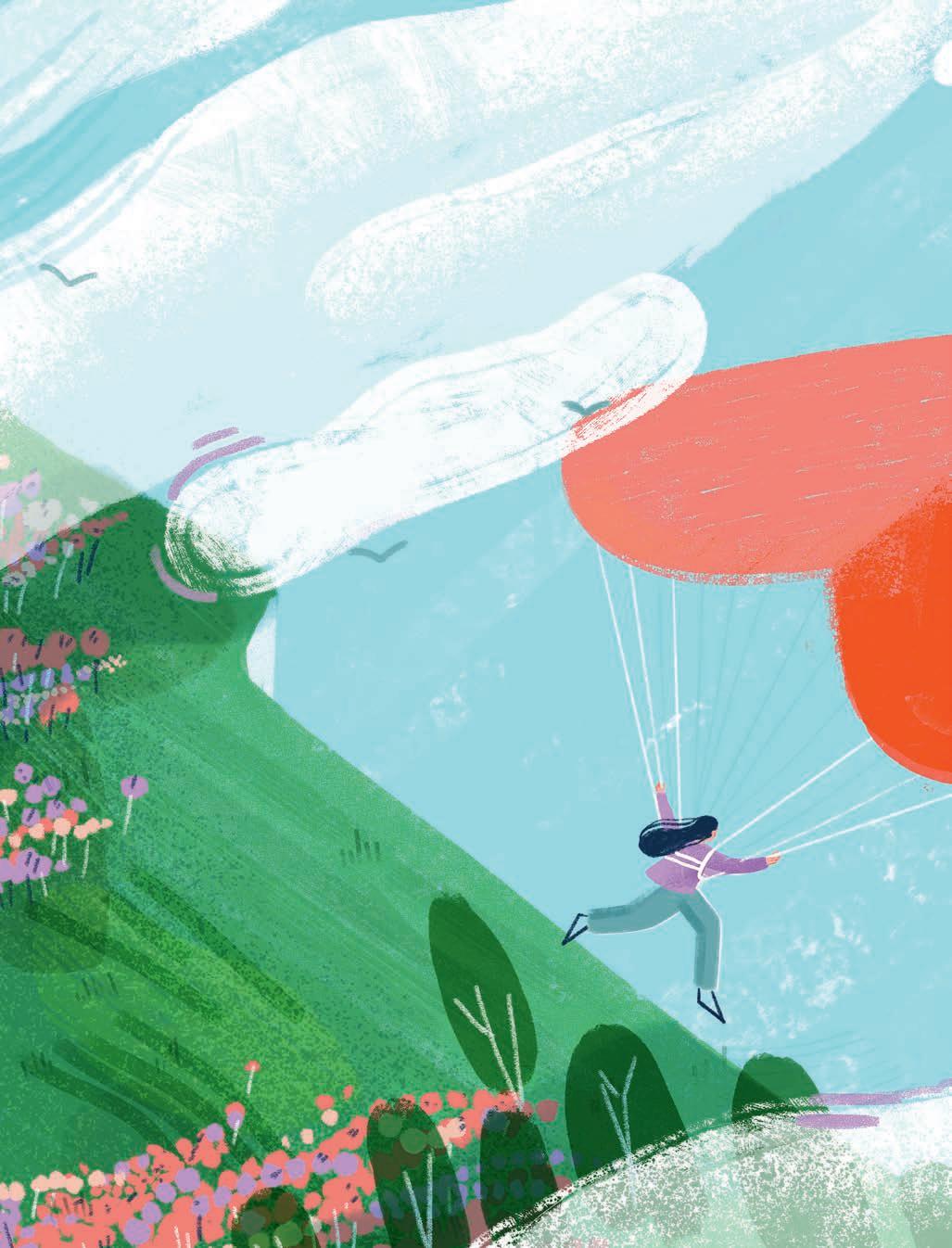
 HEART | Illustration by Alissa Thaler
HEART | Illustration by Alissa Thaler
“When the heart speaks, the mind finds it indecent to object.”
– Milan Kundera, The Unbearable Lightness of Being

So, you take this arrow, anchor it to your bow and you just…shoot! e curly haired man said, releasing it through the air, aimed squarely at a woman on the tour boat. ey watched as a smile broke on her face and her head turned, drawn to the man with a backpack besides her. See? he said. at’s all there is too it, but make sure you’re not seen. ings get messy otherwise, let me tell you. I don’t have the energy to do it all myself every year, but you can practice on the animals if you’re nervous. Plenty of pigeons about.
Fearne stood under the old timber walkway and looked out to the ames. She held the cold arrows between her ngers, admired the swirling Baroque pa ern that crawled up the limb of the bow. It seemed dangerous, this kind of job, especially for a woman, but the pay was good and Mr Valentine seemed decent. She was almost four months behind on the rent, the soles of her good shoes were going and the fridge held nothing but a can of moulding coconut milk and a slither of old cheese. is would do for the time being she decided. e day melted away in a sweet, loving haze. She thought she was making the world a be er place; dousing the streets of London with Love. She was liberal with it too, occasionally ring two if one didn’t do the trick, for some seemed so hardened by life not to be a ected by one. She broke up ghts with her arrows, watched the crowd laugh and disperse. Sometimes her arrows made people drop everything they were doing. Taxi drivers le their passengers stranded, a woman abandoned a half-cooked dinner. Other times it wasn’t so drastic as Fearne came to believe that she didn’t make people love but moved them to love, renewed what was there already. Couples clasped hands tighter and looked at each other, held their gazes just that li le bit longer than usual.
She lit up dingy Underground stations with candlelight, so ening work worn faces. She travelled far across the city, going along every tube line at one point or another in her mission. She came to imagine that the whole city had a pulse: a huge, heavy heart beating, crying out for love. e map of the Tube a network of veins moving her closer to its central organ.
But she made a mistake and was careless as day grew to dusk. It was her last arrow too, aimed at a man travelling alone looking for a hotel. He gasped as it struck him in the chest and his suitcase toppled to the pavement. Warmth ran through his body in waves, rippling and trickling up his spine and down to his toes, until he looked around, turned to see Fearne’s face peeking out behind the phone box.


I lie on my right side, wired up to the machine, gel smeared on my chest. I can see the screen as the probe slides. I recognise the heart chambers pulsing in segments like those of a pregnancy scan, but make no sense of the multi-coloured lightning ickering in a thundercloud, nor of a line of skyscrapers and a procession of sailing barges re ected in calm sea, all accompanied by glooping sounds like a radiator lling with air bubbles from a central heating pump.
Six weeks on, a le er from the cardiologist: there’s aortic stenosis and regurgitation, but neither too severe. ough a heart valve is slightly narrowed, my le ventricle is functioning as it should. I’ll be reviewed a year further on: nothing to get too concerned about, yet.


Dale types text to overlay the photo: You are about to receive ten thousand dollars! Type yes if you believe! He clicks save, names it, using a naming format he’s adopted to keep track of his thousands of a rmations, then pulls up the next photo, a generic sunrise. He switches screens to his running list of a rmations. Closing his eyes, he calls upon his intuition to make his gaze alight on the right phrase. He looks at the screen. His eyes land on All that you have experienced was only preparation for this moment. Type yes if you believe! He repeats it in his mind three times to give it intent, then switches screens to the meme-making app and types in the text to overlay an image, saves it, names it.
Dale posts the a rmations on Instagram and Twi er. Timing is everything. With half the world’s population engaging in social media an average of two point ve hours per day, the odds of reaching just the right person at just the right time might seem low, but not if you factor in the divine algorithm that organizes everything. e Internet, Dale thinks, is an avatar of Universal Mind, the elephant-headed Ganesh manifesting through microchips.

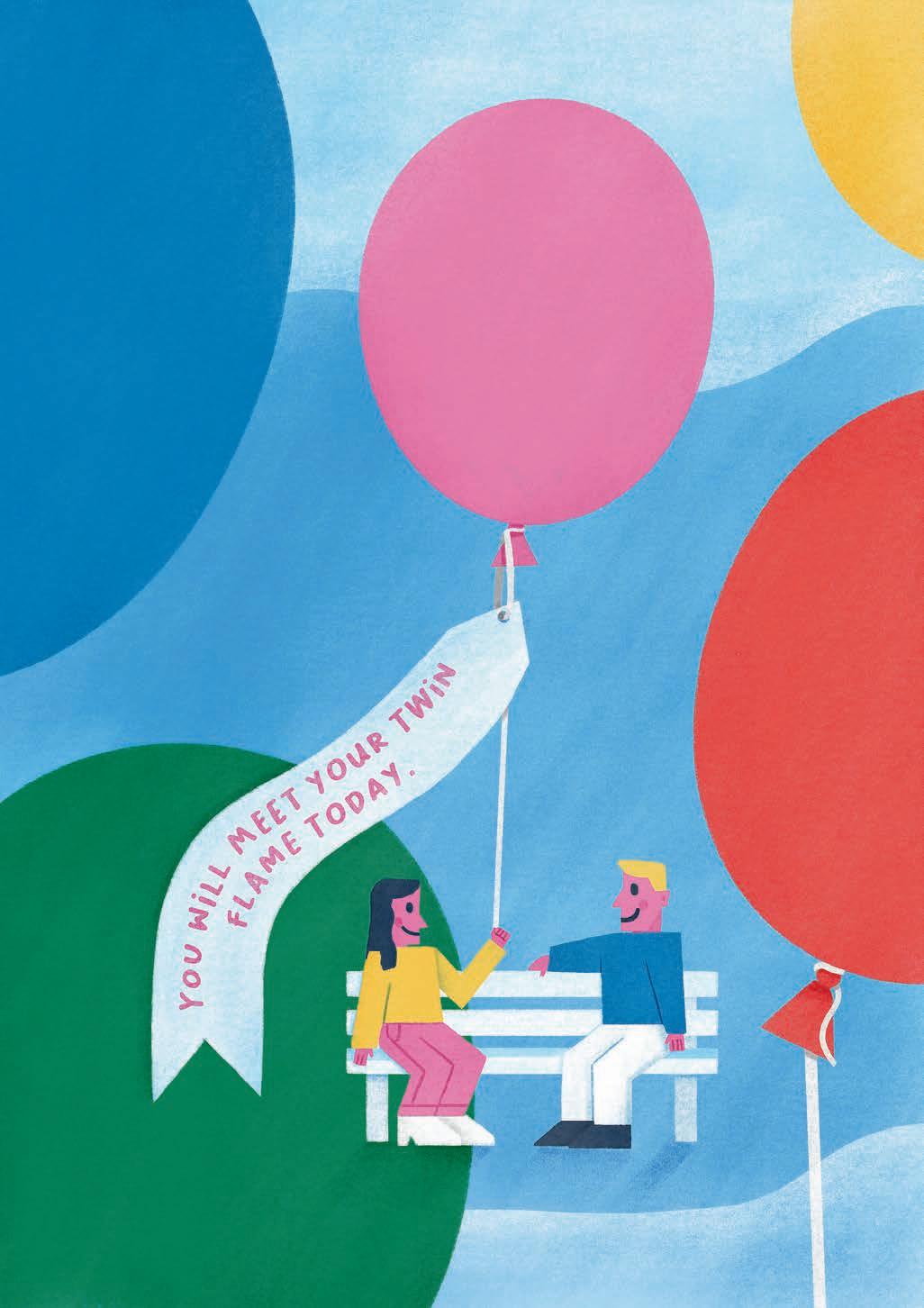
Dale feels guided to do one about love. He checks his running list, but nothing feels right. He turns to the hole in his own heart that yearns for a twin ame to burn beside him and waits for angels to put the words together. He feels it coming and begins typing before he even knows what the words will be. You will meet your twin ame today. Love is coming to you. Type yes if you believe! He nds a stock image of two lovers holding hands, but instead of overlaying these words on that image, he decides to keep this a rmation for himself.
Dale intuits he’s posted enough for now. As if on cue – isn’t everything? – the ring-tone on his phone sounds, a Zen meditation gong struck to signal it’s time to rise from the cushion. But when Dale looks at the caller’s number, he takes a deep breath and mentally crosses himself. “Hi Mum.”
“I’m just calling because you haven’t called me. I wanted to make sure you were still alive.”
“We spoke a few days ago, Mum.”
“How’s work?”
“Fine.”
ere’s not a lot to report if your job is handling packages at an Amazon ful llment centre.
“Are you happy, Dale?”
is is, at best, a rhetorical question, and at worst an indictment. If he says anything other than an unquali ed yes, she’ll drop any pretense of boundaries and expropriate his entire life. “Sure, Mum. Anything new with you?”
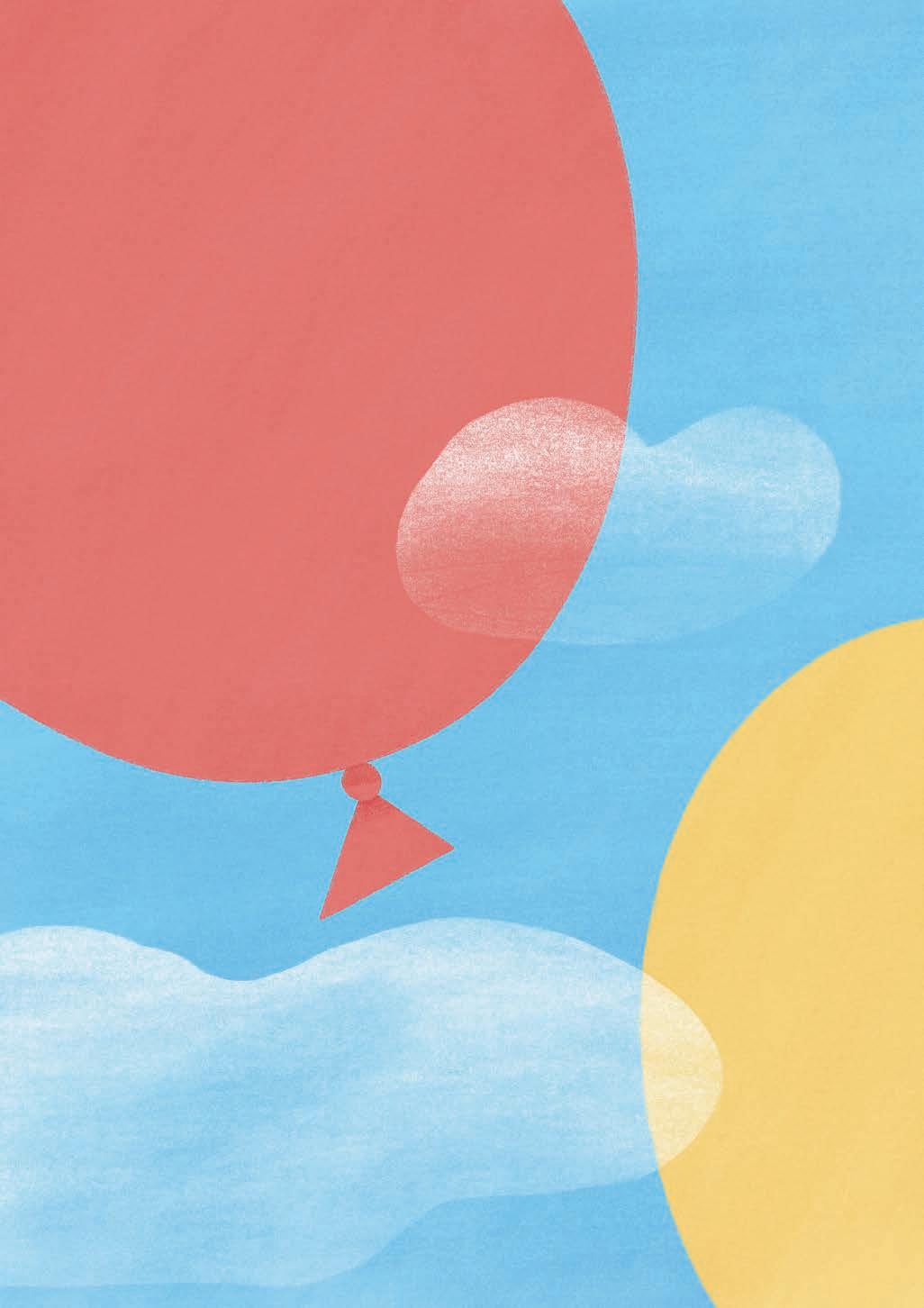
“What could be new with me? I’m in constant pain with my arthritis, but I don’t talk about it. I don’t want to burden you. I’m thinking about replacing the couch. It’s been broken for years from where you used to jump on it when I told you not to. Your father’s having problems with gas. It’s a good thing I don’t smoke, or this house would go boom like the Fourth of July ” “New couch sounds like a great idea, Mum. Well, I have to go, so I’ll hang up now.”
“Is it a girl? Do you have a girlfriend? You didn’t introduced us to the last one.”
“No, Mum, not a girlfriend.”
Silence.
“ at’s ne, no need to tell me, I don’t want to pry, so long as it’s not drugs.” It’s not anything. It’s just an excuse Dale made up to end the call.
“No drugs, Mum. Say hi to Dad for me.”
“Love you.”
“Love you, Mum.”
“Call me.”
Dale ends the call. He’s all jangled inside. And he still has more a rmations to prepare for posting. Maybe he’ll call it a day on the a rmations. Maybe he’ll go for a walk in the park. Yes, that’s what Intuition is telling him to do. Eureka! Dale pulls up the screen of his running list of a rmations and types, “Intuition is the only authority. Type yes if you believe!”
*
Megan can’t believe Tony is dumping her via text.
You’re a wonderful person, and it’s been wonderful to be with you, but I think I need time to gure out who I am and I can’t do that and hold up my end of a relationship at the same time..
Megan doesn’t believe it for a second. Tony’s just tired of her and wants somebody else. I know you’ll nd someone be er able to meet your needs.
It’s a reversible-jacket kind of sentence. It could mean he’s admi ing he’s an emotional cripple or he’s saying she’s too needy.
You deserve someone who can hold up his end of the relationship. ere’s that phrase again – hold up the relationship, as if they’re carrying a piano up the re escape and he has a bad back.
Maybe in six months or so, I’ll give you a call and we’ll catch up.
Translation: don’t text, phone, or stalk me. As if. May all good things come to you, because you deserve them. Yada-yada. Megan resists the urge to type a sarcastic reply. She types what she knows she should type – I understand. Good luck in your journey. Take care – and clicks o her phone. Megan isn’t brokenhearted. She’s pissed because he was the one to break it o instead of her.
What a way to start the day. Fortunately, it’s Saturday. She has the weekend to get the taste of Tony out of her mouth. It’s only eight thirty, but the sun is blasting through the window of her apartment. It’s a good day to go to the park. Besides, she doesn’t want to be in this apartment that still reeks of Tony’s vibe. His vibe is a ngerprint at the scene of a crime, the crime of bad judgment in men. She sticks her apartment key in her trouser pocket, grabs a book she’s been reading, and heads for the door.
*
Dale shades his eyes with his hand. Sunshine angles through open spaces between the summergreen trees, already powerful though it’s only nine am. Dale doesn’t mind he has to shade his eyes because the heat feels good against his body.

Dale has an a nity with Ra, the Egyptian sun god, because Dale might have been a temple priest back in the day. As Ra rises above the tree line and people and plants alike begin to groan under the August heat, Dale will just smile the way all-seeing Ra smiles.
Dale’s mind is lled with a rmations oating randomly in and out of his consciousness like balloons. It reminds him of pigeons at the beach that pester people on blankets for a scrap of sandwich or a potato chip, a ock of would-a, could-a, should-a. Dale wants to get away from them, get away from his mother, just let life unroll however it’s going to unroll without the burden of “doing” something.
Dale spots a couple of benches under trees. One is occupied by a woman in pink shorts with her nose in a book, but another bench ten yards beyond her is empty, as if it’s meant for him. He strides over and sits down. He un-focuses his eyes and takes a deep breath, focuses on breathing in and out, slowing it, deepening it, until everything is a li le fuzzy. It’s like opening a window and le ing in fresh air, except the air is also light. Dale may not be good at life, but he’s fair to middling at meditation.
A er a few minutes, his a ention returns to his senses. He looks at the ribbon of asphalt winding through the trees. e walking paths are empty at the moment but that will change.
“He’s fair to middling at meditation. ”
Sure enough, he sees someone emerge from the shade around the bend, a man with a clutch of balloons.
*
Megan li s her eyes from the book. ere’s a man standing in the grass beyond the walking path. He wears a baseball cap that has no team logo. He’s holding a dozen balloons on strings. She wonders whether there’s a fair in the park or if he’s advertising something. She returns to reading. Her book is about synchronicity, or meaningful coincidence. Synchronicity evidently is something somebody named Jung came up with, though the author says Eastern religions believe in it, too. e idea is events that have no apparent causal connection are actually connected in some other dimension of experience, which sounds pre y woo-woo. If it’s in another dimension, how could we even know? But Jung says there are no meaningless coincidences.
Megan thinks the quest for the meaning of life is a fool’s errand. If there were an answer, somebody would have gured it out by now. Megan has her own answer: sometimes you’re happy, sometimes you’re sad, good things happen, bad things happen. Bad things like Tony dumping her. But is that a bad thing? Maybe it’s a good thing. She’s surprised how easy it is to let Tony oat out of her life. She feels like she just lost ten pounds. “What do you say?”
It’s a mother on the path speaking to her small daughter. e man in the baseball cap is handing the li le girl a balloon. It’s bright yellow. e girl walks ahead of her mum, gazing raptly at her new balloon as if she has the whole world on a string. ey pass a li le boy wearing a blue Paw Patrol t-shirt. He lets go of his mother’s hand and points greedily at the li le girl’s balloon. en he laughs – the balloon man is walking toward him, extending a blue balloon in his right hand. e boy takes it, delighted.
Megan goes back to her book, reads a few pages, but every few minutes nearby movement or the sound of “ ank you!” pulls her vision back to the balloon man. is pa ern repeats over a period of half an hour, and now the balloon man has given away almost all of his balloons. He says nothing, asks for nothing, no money changes hands. He’s just giving away balloons. She notices again that the balloon man has no logo on his ball cap. For some reason it strikes her as subversive to not be for one team or the other.

*
ough Dale’s bench is in the sun, a nice breeze cools him from behind, stirring the leaves in trees across the walkway, a pa ern of whispering. He thinks of Findhorn, a spiritual community in Scotland, that communicates with the intelligence of plants and the angels, divas, and fairies of nature. Working cooperatively with them all, Findhorn miraculously can grow amazing plants and herbs in barren sand. e inexplicable fecundity of Findhorn mutes naysayers who think angels and fairies are woo-woo. Who can deny the empirical evidence of a forty-pound cabbage? Dale studies the movement and sound of the branches to discern if there’s something alive in there. Suddenly his view is blocked by a gure in front of his bench. A man is bowing to Dale. His arm extends and he hands Dale the string of a balloon. Dale takes it. He looks up at the balloon. It’s pink.
When Dale looks down, the balloon man is walking away from him. Dale watches the man disappear down the walking trail and into the shade.
A sweet smell hangs in the air around Dale’s bench. Pipe smoke? Pot? Sage? He can’t tell. And now he’s holding a pink balloon that’s bobbing and dipping in a sudden breeze. Dale grips the string tighter to control it as it blows to his right, in the direction of the woman on the bench, the one with the book. She’s watching him. She’s pre y. She’s wearing pink shorts, a shocking pink that lassos the eye.
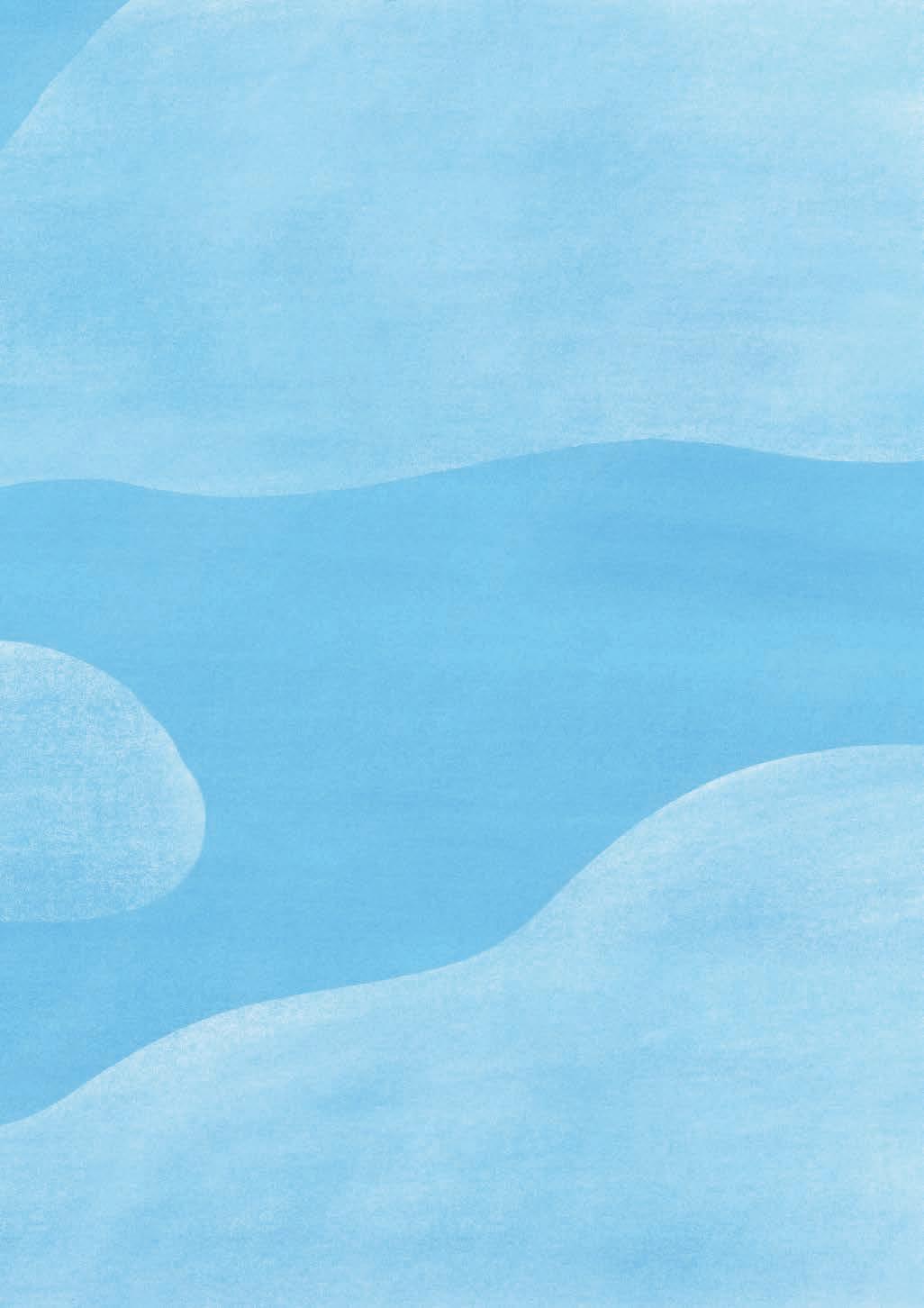
Another gust of wind makes the trees noisy. For a moment, it seems the trees have a throat and tongue speaking to him. But what are they saying? Something that feels like a powerful magnet pulls his eyes back to the woman on the bench. She’s still watching him. Again, he notices those pink shorts, bright as a are in deep shade.
Dale stands. His feet have a life of their own and carry him over to the woman. She holds his gaze. A welcome sign hangs in her eyes. When he reaches her, he stops and extends his arm holding the balloon.
“It matches your shorts.”
“What a coincidence.” A corner of her mouth curls up. “ ere are no coincidences,” he replies. Her jaw drops. “Damn!”
He waits for her to explain. She shows him the book she’s been reading. Dale recognizes Carl Jung’s picture on the cover. Dale grins.
“Damn,” she says again, shaking her head. e features of her face so en. Dale extends his arm again and she takes the balloon. She smiles.
*
e August sun is disappearing into dusk, the crack between worlds.
I close my eyes. I see that it will be in winter, at a third-generation hippie restaurant, when they are celebrating their sixth-month anniversary of being together.
Her suspicions will have dwindled to a speck of dust because he’s a puppy that just keeps licking her face. She will wear the Ra t-shirt he bought for her. She wears it not because she’s into Ra, but because it’s a cool picture of an eye. He will be reading Jung’s Man and His Symbols and will wear glasses instead of contacts to look intellectual for her She will have a Greek salad. He will have a tofu and vegetable dish served over rice. ey will drink too much. And, for the umpteenth time, they will reminisce about the day they met at the park.
He will talk about the twin ame a rmation he composed that morning, how he saved it for himself, and about fairies in the whispering trees. She will talk about synchronicity and they will have to admit, yes, the pink balloon matched her pink shorts. ey won’t say much about the man with the balloons. ey won’t remember his face, only the baseball cap. at’s okay. I wasn’t selling anything. I wasn’t asking for anything. I was just giving away balloons.
“A welcome sign hangs in her eyes. ”




 fiction by Reema Rao-Patel Illustration by Tim Alexander
fiction by Reema Rao-Patel Illustration by Tim Alexander
You tell yourself you won’t be like those American mothers, seduced by consumerism – their false promises for a happier baby that make you a be er mother. en you nd yourself at Mummy & Me Paper Maché, asking to see the TwinnTM catalogue the others are passing around. A doll for your irreplaceable child that looks just like her.
All the mothers are doing it.
Please provide a photo om each angle listed. Circle the skin tone that best represents your child. Nothing quite matches your daughter – a precise combination of your jaggery and his “tar.” A colour that justi ed disowning you. A ach a three-inch lock of hair. Measure the width of your child’s nose. Both, like his. Not enough of you to be taken back. is paperwork details more than a marriage license.
All the mothers say it’s safe to provide the information.
Her TwinnTM arrives in a box marked “fragile: handle with care” on every side. You remember bringing your daughter home from the hospital – only cautioned to support the neck. Someone should’ve wrapped your own body, your whole soul, with “fragile” tape.

You cried for months and so did she, which made you cry some more. At some point, it was hard to tell who was making whom cry. Your husband kept researching “baby blues,” while you kept yelling, “It’s not baby blues!” He used to take the baby from you then – there was no one else to side with you – until inevitably she needed to be fed.
Her TwinnTM doesn’t look exactly like your daughter, but it’s her. You see it. Maybe like the sibling you wanted to give her, that’d make strangers say, “I can tell they’re sisters.” is doll won’t cry, which means you won’t either. She won’t tell another mother at a playdate that mummy and daddy ght louder than the television; the other mother doesn’t look you in the eye when you come for pickup. She won’t ail like a dead sh on the sidewalk for no good reason; a biker yells, “Hey lady that’s dangerous!” No shit.
She won’t beg, “No Mummy! Only Daddy!” at bath time; this one is yours alone. Her skin turned out a toasted cane-sugar, more like yours.
You think about the day you wanted to slap your daughter, hand itching, and then you did it. She once tore your esh, and now your heart. at night, she still asked you to tuck her in – lay the stripes of her blanket longways not horizontal, the way she likes – with glossy love in her eyes. is one won’t blink. Her rubber face, however so , won’t crumble from a slap. Not even a dent.
All mothers agree it’s great quality for the money.
Your daughter asks to hold her TwinnTM, armed with soap bubbles bound to wreck her hair and markers that’ll slash her cheek. Some damage is inevitable. But you don’t let the doll go, not yet. You deserve a second chance.
All the mothers say so.
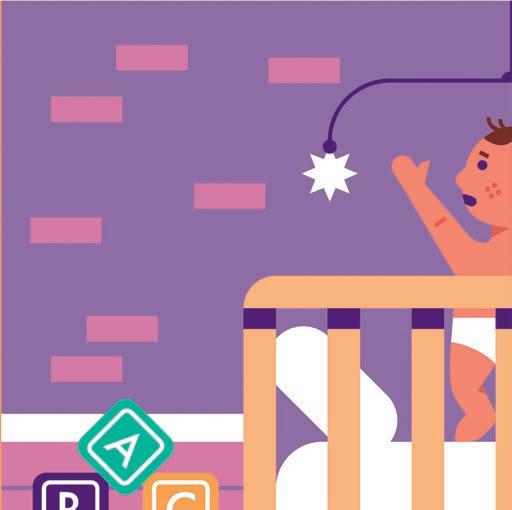





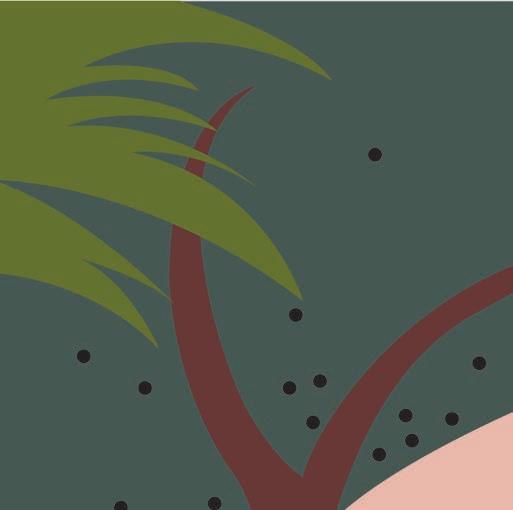
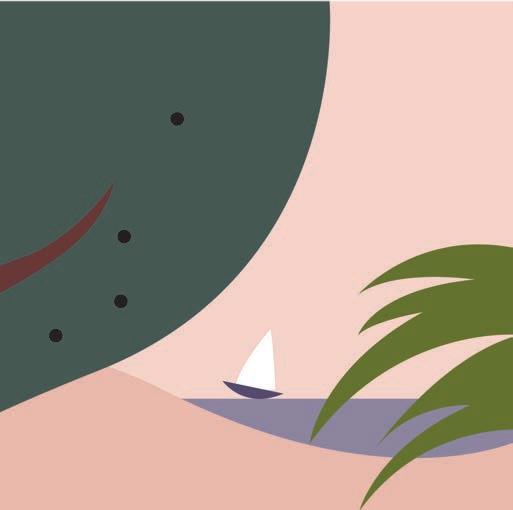


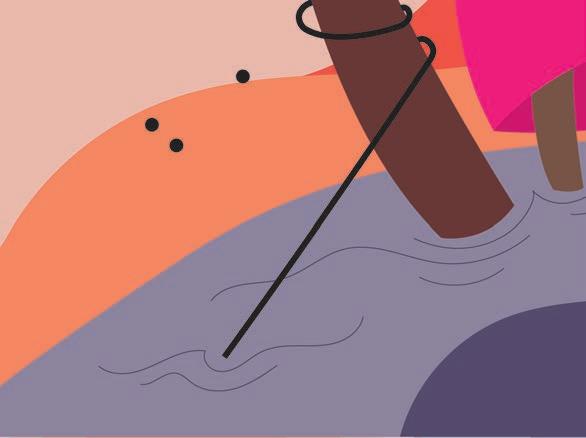

Late July
e music was still playing when Dalton Changoor vanished into thin air.
Marlee, Dalton’s young wife, had only realised he was gone when the winds swept up the yellow tarp that usually covered his red Chevrolet pickup. e tarp now thrashed, abellate, between two coconut palms. Against the lightning, it looked like a giant long-winged harrier in descent. e study, where Dalton had le a record of Roaring Lion’s “Ugly Woman” playing, was vacant. As was the porte cochère where he usually kept his pickup parked. ough his sudden absence concerned Marlee, she didn’t let it weigh on her thoughts. at was until she found a note on the kitchen table, wri en in a hasty scrawl: Leave the doors locked. I have the spare key with me. Tell my mother I love her.
ps Go to the cherries and untie Brahma.
Dalton owned three German Shepherds. Vishnu, Shiva and Brahma. He bought them from a breeder who lived in Sangre Grande. e breeder, a wiry man who looked canine himself, told him to starve the dogs in their early days. It’s for the best, the man said, keeps them hungry, keeps them vicious. Dalton ended up spoiling them fat instead. ey were only e cient as sirens. Never gave chase, never dared to bite. But they looked like they would – that’s what ma ered. ere had been no shortage of prowlers and larceners from the various barracks and se lements lain radial across the plain. Some of them Dalton believed to be kith and kin of past groundsmen.
Whenever he heard the dogs at night, he retrieved a red biscuit tin from under the bed. Inside were recrackers he purchased whenever he a ended a fair. Using a tinderbox, he’d light them and toss them from the window, the bursts of sound like cracks of gunshots. Sent the prowlers scampering and the dogs howling.
Despite having a loaded Smith & Wesson revolver in his nightstand drawer, two Colts in the dresser and a Winchester shotgun hidden behind the bedroom closet, the recrackers remained his preference. Saved bullets that way.
Marlee had never been fond of the dogs. ey’d been there longer than she had, and they were keenly aware of it. On the day she arrived, ve years ago, the German Shepherds lay bundled as a trio of necks on the foot of the porch, watching as Dalton pulled up to the porte cochère that extended from the side of the house. ey snarled and barked until their nostrils expelled mucus. One made a move to snap at her. A er all this, they had never warmed to her. And never would.
It was strange how much life could change in ve years. Five days. Five seconds. How they had met was a secret to the world.
All was past and prologue – and she was thankful that Dalton never reminded her of it. She gathered that a man so nonchalant about his spouse’s past was a man who wished others could feel the same about his. Back then, her hair was a long, braided rope. Her skin light brown as the throat of a forest ood. Eyes bright and so as misted stars. e misery of ethnicity did not seem to concern her – not even she knew exactly which ancestral spotlight to stand beneath. She was no older than seventeen when she met Dalton, who was more than twenty years her senior.
He thought she was the most beautiful girl he’d ever seen. Something classical and gothic about her as a Bo icelli belle. Darkly angelic, as if her presence should be accompanied by a canticle. He, on the other hand, had a face that looked like a wine bo le had been smashed into it. A gangly, greasy man. Sharp, cu ing features. Aquiline nose. Sinuses always stu ed. A small brown nevus in his le eye, as if his iris had splintered. If you saw his silhoue e in the twilight, you might have mistaken him for a scarecrow come to life. Children would’ve snickered at his appearance if they weren’t aware of his money. Fiend money. Was easy to think of him as a end if it weren’t for his fair skin, almost Kashmiri. People thought twice before swindling a sahib.
Marlee decided that she’d wait until morning to check on Brahma. Dalton usually carried a leash with him if he ever went down the hill to the Surinam cherry orchard. e area was fenced so the dogs couldn’t venture there on their own. Surinam cherries were poisonous to dogs, and so Dalton tied them to a wooden stake when he was down there with one. He must have forgo en to undo Brahma that night. As eccentric as her husband was, he took sedulous care in those dogs. To relinquish such a chief responsibility to her was unheard of. And if he expected her to venture out into a storm just to unleash a hound, then he must have truly lost it.
When Dalton rst brought her here, she was surprised at how far removed it was from the village. For at least a mile and a half in each direction, there was nothing but road and woodland and the odd shack lled with rumours. e row of electrical poles leading up the undulating roadside seemed only to supply this house. e house, a cage locked in a vault of boscage.
Before they were married, she had questioned his business. His answers always came in the form of gi s – linens, sandals, bangles, skirts, rouge. His business was his business. ere were very few people that he trusted. He told her that he’d red all of the house sta two years before she’d met him. e chef, the chau eur, the housekeeper, everybody. ey weren’t to be trusted, he said. He hired three new men to tend to the grounds and to the crops, but they were to never set foot inside his house.
He told her that he’d inherited the land from his father. And his father from his. He imported crates of furniture, artwork, ornaments and tapestries from India and England. e arable land


“The principles of the underworld shift all the time.”
and crops yielded pro ts – Marlee was certain. But the kind of money that Dalton brought in seemed ecked with blood.
He was involved in criminality; it was the only explanation. His secrets insidious, his soul scripted to perdition. e principles of the underworld shi all the time. at is its nature. Every faction sets up its own morals. Every god breaks its own rules. A spinning wheel, where everything comes back to the beginning, sooner or later. If he was willing to be a spoke in that wheel, Dalton had to know that he was going to have to pay for his sins one day.
She let the record play again, made Ceylon tea and listened to the storm. ere was something scary and fantastic and exciting as the lightning seemed to creep through the window. As if God was reaching out to her. As if to answer some lost prayer. e morning a er the note, Marlee went downstairs to prepare breakfast. Dalton wasn’t there –usually, he would be at the kitchen table with his bifocals, skimming the newspaper. He brewed his own co ee and drank until his nerves were shot.
Preferred imported arabica to the locally grown robusta. Marlee maintained the house, did the washing, the folding, the sweeping, the dusting, the chopping, the cooking, the baking. Did it for her own sake, at least. ere were never any guests, soirees, co ee klatches, birthday parties.
e living room, kitchen, bedrooms, the wainsco ed staircase only held memories of them both. Because of this, the house always felt like some concealed shrine. e wordless stillness of the house now made the gloom of the air more apparent. Its silence holy and eerie. For most of the day, she was a ghost roaming a haunted manor. If he wasn’t in the kitchen, perhaps he was in the outhouse – a single-roomed shed that he had fashioned into some sort of strange sanctum.
A nymphaeum that held nothing but a giant oil painting of a Chinese goddess.
He made it clear – she was never to enter unless he was there too. As if she were too profane for it. e goddess, like the dogs, had been there before her. e goddess, draped in lavender and topped with a phoenix crown, surrounded by four jade maidens and giant messenger bluebirds.
Marlee very slowly turned the knob, tipping the door open. Dust wa ed like snowfall within the dim, tomblike room. Dalton was not there. e goddess and her maidens glared at her sternly as if she had interrupted some invocation. It was only recently that Dalton had shared the goddess’s name with Marlee.
Xi Wang Mu, Queen Mother of the West.
One day, he admi ed that his mother’s soul had been absorbed by the painting and spoke to him through the canvas. She also learnt that the apparition had once been impressed with her and even suggested his marriage to her. But no more. His mother now saw Marlee as a liar and a charlatan. at woman simply isn’t devoted, Dalton. He confessed that there was li le he could do to change his mother’s mind. All of this he had divulged unprovoked.
Marlee married Dalton, knowing he was unsound of mind – but his condition signi cantly worsened over the past ve years. Paranoia, dementia, monomania – she wasn’t sure how to describe it. He had rooms with towers of newspapers and magazines and boxes and all sorts of ephemera. Flew into rages at the slightest mention of tidying those rooms. e house itself was a hodgepodge of things foreign and colonial and postcolonial and antebellum and pre y and gold and red and scintillating. It was ungainly and disgusting, just like him. e note about the spare key was still on the table.
It was only then Marlee remembered Brahma.
Still in her co on nightgown, she slipped on her outdoor shoes. e tarp now hung accidly in a yellow grin from the coconut boughs. e land was wet but up on the hill, ooding was never a problem. Downhill, where the cherry orchard was located, a rivulet fed a pond a short distance away. e rivulet had go en hungry over the years and each time it rained, it engorged. Ate the land around it. It was bad for the cherries, and so Dalton grew them only for personal enjoyment.
A small stone stairway was cut into the hill. Only two steps down and Marlee could see how damaged the land had become. e river had indeed widened, the soil scarred with muddy rills. Her hand went straight to her mouth when she noticed the wooden stake. e a ached leash, taut, led downward into the still-rumbling river. She took slow steps until she came to the edge, where she could see the dog a ached to the other end. A bloated ball of sinew and fur.
Brahma must have slipped down the embankment. e river was climbing to meet him, growling like some predatory animal.
Marlee turned around to see Vishnu and Shiva behind her. eir faces didn’t show it, but she could hear their growls. Wasn’t me who killed your brother, she wanted to tell them. She went to the steps and whistled for them to follow, but neither obeyed.
On her way back to the house, she pondered her own feelings about the dead dog. ere was no sadness. Sure, this was not her doing. It was not her who forgot to untie the dog, and certainly, she was not to be expected to brave a late-night thunderstorm to make up for its owner’s carelessness.
She returned to the house, where the crapaud back pumpkin patch and avocado trees came into view. She called his name.
No response. At the empty homestead, she called again. Nothing. With that, she returned to the kitchen, made Ceylon tea. She would usually sit on the porch to drink but that morning, she took it to Dalton’s shrine. Le the door open, sat cross-legged on the dusty oor and sipped, staring Xi Wang Mu right in the eyes. e goddess stared back. Both in silent judgment of each other.
When she was done, she went to the stairs of the porch, arms outstretched to the sun. Ahead was a fenced patch of land, once used as a paddock and recently converted into a small playing eld. Dalton had prepared it for the children of Bell Village.
Didn’t make much sense to her – him opening his gates to a bunch of li le strangers. During the last county fair, a er much deliberation, he stepped onto the middle podium and announced it to the village. All under the guise of giving back – though Marlee was suspicious. From the end of the school year to the beginning of the next, all children were welcome. He wanted them to use the paddock for sport.
He set up a radio he’d bought from the Redi usion company. en toys, which he packed into a chest. Miniature dollhouses, plastic soldiers, slinky springs, dimestore comic books. He had his three main workers prepare the dusty course of a cricket pitch in the middle of the paddock, bought willow-wood cricket bats, smoothed with linseed oil, and a crate of cork balls. Now there was no longer the need to forage for a coconut branch and baby shaddocks to play the game.
“Wasn’t me who killed your brother.”
e children arrived in droves. Wild shadows dancing under the a ernoon sun. To them, the house stood as tall as the range, the front topped with three steep eaves, an ethereal sunburst atop the middle spire. e sides were of simple fenestration with the exception of two Demerara windows that always made it appear as if the house were peeking out with half-opened eyes. ey were only allowed to enter the rst room to the le of the foyer. ey were, under no circumstances, to venture past the staircase. Upon entrance, greeting them was a triptych portrait. Paradise, earthliness and, nally, apocalypse. In the details were creatures and expressions cryptic and wonderful. It lay open like some mystical book, a bu er y in an abandoned church.
Despite its ornate fretwork and fanlights and cra smanship that teetered between Mughal and Art Deco, there was something intangible and sad about the Changoor house – as if it solely existed to recall greater times of heritage. Like a general of the vanguard, felled in ba le, still adorned in his military emblems. e room to the le was bright, immediately visible. Inside were goose-feather cushions strewn across a oral velveteen rug. A small, round table set up with a centrepiece of poinse ias anked by two carnival glass bowls. One with cut guavas, the other with carambolas. e mahogany stand at the end of the room like a king before its loyal subjects. Its crown, the box radio pra ling the words of Abbo and Costello. Vinyls were stacked on a stand. A royal ush of big band and jazz and calypso. Glenn Miller and Benny Goodman. e crooning of Vera Lynn and Dorothy Lamour. e brass of Atilla the Hun, Roaring Lion and Lord Invader.
♪Since the Yankee come to Trinidad ey got the young girls all goin mad Young girls say they treat em nice Make Trinidad like paradise ♪ Marlee had no part to play in this invitation, though she was aware that many believed Dalton had done all of this for her. It ra led him how she couldn’t bear children for him – and he had once called her as dry as the Atacama. But she believed it was the opposite – it was he who couldn’t accomplish the deed. If he couldn’t have his own children, he would treat others’ children as his own, he’d said to her. Said that his mother told him it was the right thing to do. Marlee was greatly worried by this sentiment. If his sense of the right thing to do came from a possessed painting –then in actuality, there was no sense of the right thing to do. ere was no sense at all! Recently, she’d wondered if the painting had commanded him to re all of the house sta . Now she knew. en again, had Dalton ever done anything to suggest he was sane?
She had begun to notice an odd habit he’d taken up with the children. He would come into the recreation room in the middle of the radio shows, hay sprouting from his boots, tracking mud on the herringbone tiles. Asked children their names, their parents’ names, their birth dates. His face uncomfortably close to theirs, grinning and staring unblinkingly into their eyes.

As if searching for their soul.

As if waiting for a sign.
From the novel “Hungry Ghosts” by Kevin Jared Hosein (Bloomsbury, £16.99)
She is still on the back step, even though the evening sun has cut the garden in half. She is on the dark side. I bring a bloody-stained and holey bag of cherries. Still sullen she accepts this peace-o ering. No eye contact, she shi s along just enough room for two. We well know.
Dangling a brace of shining hearts she catches one in her teeth and separates it from the other, esh from stem. Sweet, sweet surrender of the stone sucked bald and launched with full force into the unknown.
She hands me the lone fruit. Luscious bursting. e missile is mined I spray an arc of benzaldehyde and spit cyanide seeds into the dark. is is how it goes, and we are nine and ten again, ring pits into the ower beds, against the wall, at next door’s cat. Purple-sma ered and joyful. Before we knew what addiction was or social deprivation or single parent families or motherhood or ever leaving this town. Or not being two.




He had a rubber mouse that he would talk to when nobody else was around and he was able to be most like himself. Whenever he wasn’t digging holes, or playing with his cars in the dirt, he would be deep in conversation with his mouse, his friend. Nothing they said was taboo. Nothing o limits. Everything was clear and open between them.
en one day, for reasons lost in time, a decision was made between boy and mouse that the mouse should be set free. And so following an intricate ceremony of goodbye the boy threw his mouse into the long grass at the top of the garden.
e regret was instantaneous. His loss was real. He searched the grass again and again but to no avail.
Even now, a er a lifetime of friendships and loss, he still thinks of his mouse, especially when the frost is hard, and the morning is dark. He still thinks of his friend. Alone, but lled to the brim with love. Filled to the brim with secrets and love.

e night I slip inside my lover’s heart, I can’t escape the taste of blood, nor the smell, nor the pulsing of a beat around us like those clubs he enjoys—umm-pah, umm-pah. Past the atrium, it’s an entire chamber of red walls and vaulted ceilings that stretch up forever. And the women everywhere, slender, with dark, made-up eyes, amble up to bars, lounge on oversized couches, give bored smiles. He certainly has a type.
Really, I don’t belong in this club for the pre ier, hipper, set. But I am somehow past the roped-o entrance, someone has made a mistake and I’m here, certain I cheated my way in, and then just as quickly, overcome by self-consciousness.
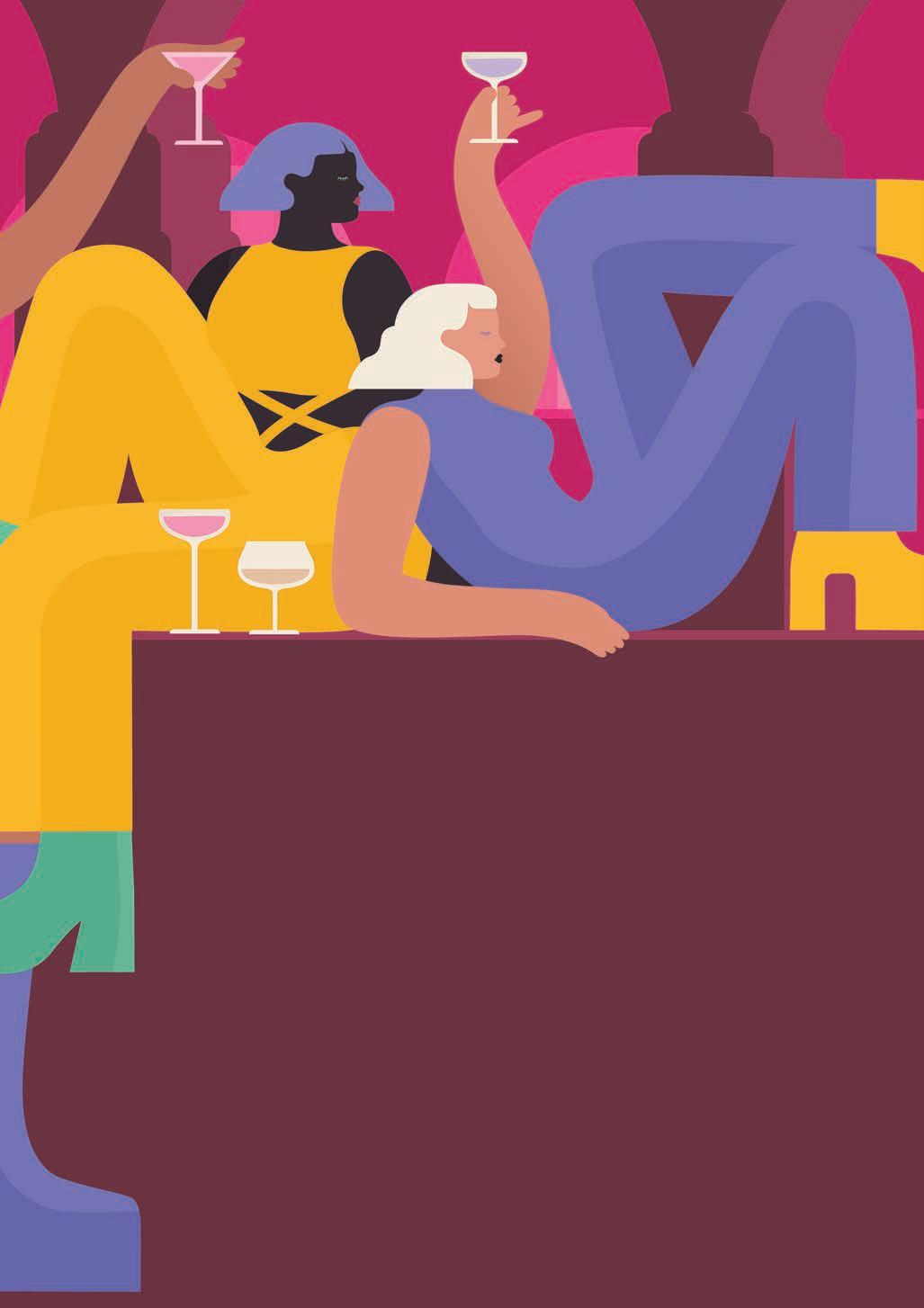
In the other, greater world, I am asleep, or he is rather, on a large and gaudy four-poster bed, next to a phone that is always dinging and lighting up the room at odd hours, beside a cigare e case that goes everywhere with the phone. But here, inside this heart, are high walls, and women everywhere, a long bar, and a seemingly eternal wait for a drink. I’m waiting to order a gin and tonic. But behind the sticky bar, there is no one.
is very evening, Valentine’s Day, we walked together across the wooden bridge over the
pond by his house, and he took my hand and said, “I like when you hold it this way, not that way,” interlacing his ngers one space apart from the way I do. And when the wind blew hard, I tucked my hands inside his jacket pocket. I was enchanted by the li le pond and pausing at the top of the bridge for the view.
But inside the jacket pocket, next to my ngers, his phone buzzed and buzzed.
I recognise a few from photos, these women who take up space in my lover’s heart –women in heels waiting for drinks. e woman he dated just before me leans against the back of a chair. A stream of sunlight coming from a crevice in a high wall highlights a stripe of light down one contoured cheek. She rests easily, while I crack my wrists and search for a familiar face. I belong in a dark bar with black walls and gra ti, with dogs padding around, with a breeze, with women who take their shoes o and splay their unpainted toes.
Not here, in this place were feet are always crammed into triangle shapes. But here I am, a er all, in the sort of bar he prefers.
e fact that I didn’t belong with him or in this life didn’t stop me from running toward it at full speed. Maybe it was an experiment to try on the life, just brie y, of the pre y girls in school who ended up with men like him. Maybe it was my talent for acting, that I could occupy, for a while, the role of the woman who stays out late dancing a er too many shots, never mind she might prefer to be at home in pyjamas.
A couch beside me has the residue of something that smells like bourbon, but like the others, it’s occupied. I contemplate my lover’s heart, my own heart, and what might happen if I do leave this place and him. I suspect my heart would break. Not in a metaphorical way. I mean structurally. Walls coming down, blood rushing to the centre. A physical rupture. Sometimes I envy him. To have a heart as big as a ballroom would be easier. I can barely t anyone into mine. My friends say my heart will make room for others a er him, but I’m not sure. e walls of my own heart are already taut, like the stretched skin of a pregnant belly, near rupture with memories.
And who knows how I got here, or even what I am looking for in this sort of bar, with its spacious walls. My lover always said that love doesn’t disappear, it simply moves on. Is this what he meant? Is love a ballroom, bouncing from one person to another? ere is something o about the women inside this chamber. His high school sweetheart has a graceful, fawn-like face. But the real one, from photos I’ve seen at his mother’s, had a more con dent look, less afraid, sturdier and with fuller cheeks. ere is another woman somewhere in this space, the one he was still with in our earliest days together. “We weren’t quite exclusive yet,” he would tell me. “I wish you could get inside my heart and see how I feel about you.”
Of course, his heart, like any, has cracks. ey aren’t so di cult to nd. So, while he was

“Love doesn’t disappear, it moves on.”
sleeping, I pried one open, so gently with my ngers he couldn’t feel it– and made my way inside this chamber.
“How did you meet?” I ask a woman with pink lips in a blue bridesmaid dress.

“Our friends’ wedding. He told me my dress was beautiful. He loved the way it lay on my body. He said the blue brought out my eyes. It was my colour.”
“Oh,” I say. “He once told me something similar.” But my dress was yellow. Now, I see it in the memories of the other women. I see them tumbling into bed. I hear him whisper, “Darling,” never caring if it was too soon for such intimacies.
For each woman I encounter, I can hear the memories, buzzing and pulsing around me, and remember with them what he said to each.
“Red is your colour.”
“Black is your colour.”
“ is is your colour.”
“Your dress.”
“ e way it ts over your hips.”
I want out of this place. I touch my throat and feel a silver necklace. I look down and catch a ash of yellow. I am wearing a yellow co on sundress, but my yellow dress wasn’t a sundress, nor was it quite so bright.
Once, during a rough patch, he disappeared for most of a night and wouldn’t say where. I pressed, and nally he said he’d walked to the bridge over the pond, the one we stood on together, but this time he went alone, and he paced alongside the geese, and tried to think through what to do about us.
“What did the geese advise?” I’d asked. But he didn’t crack a smile and didn’t answer.
I touch my lips, and a trace of red comes o on my nger. I don’t wear lipstick. But the woman I am here wears sundresses and bright red lipstick. And it’s early autumn, the way it was when we met, and this dress is a version of what I wore then, and it hits me.
I exist, here, only as a speci c moment– his version. I can feel he how he wanted me, and not just that, a deeper feeling. Love, eventually. And I see it will end. at woman in the yellow dress, who is me, will end it. She saw inside him and she couldn’t nd a couch or a chair in this place and didn’t want to compete for a place to sit.
I wore the yellow dress the warm a ernoon in early autumn when I met him for co ee, and he was pulsing with energy and talking too quickly, when he stared into my eyes across the table, when I surprised him with a kiss.
I marvel at how di erent I am here in his heart. My hair is thicker and straighter, the way he wanted me to wear it, my weight sits di erently on my body. I was – am – how he remembers me. I nally feel the walls within my own heart shi ing, a small space opening.
And I feel, with certainty, his certainty contained in this room, that there will be others a er me. It is not a profound or enlightening moment. I am just tired.
I want to wipe o the lipstick and take o the yellow dress and put on sweatpants, but I can’t, because he doesn’t remember me like that, and I’m trapped. at has always been my problem. I’ve never had a good exit strategy, can’t think of one even now.


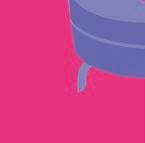
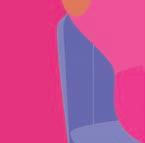




With each deafening pump, his walls grow outward, ever expanding, and mine close in. My heart is a delicate structure, made by a shoddy engineer. Poorly framed, thin materials, cracks everywhere. I feel the walls starting to crumble.
It won’t be long now. It’s too full already, and my walls can’t withstand another break.




I see now how it ends. He will cook dinner. He’ll text another woman. He’ll ask me a dozen times how I am feeling. But he was warm and kind, and that was why I stayed for a while. He will kiss my forehead and step out for a cigare e with his phone. But he said he loved me. He said yellow was my colour. He liked it on me, but he didn’t remember the right shade.
In the morning, his warm arms will wrap around me even as his eyes dri somewhere far way. In his heart, that expansive chamber, the walls will continue to balloon outward. I realise that for as many who came before me, there will be room for at least as many more. With each beat, I see his walls growing wider, the ceiling higher, the space emptier and lonelier. e women are bored and know they are alone, and this entire time in the chamber, he has given them nothing to quench either hunger or thirst.
He will never ll the ballroom, and it will never feel complete – his own brand of horror. I think, if I had to guess, he is sorry for the way he is.
I am older and feel wiser than the other women who occupy his heart. I can’t help but notice how they seem to confuse his intent gaze, the upward curve of his mouth with something weightier. How re ned they seem, how lovely, how practiced in saying the right things. ey are not stupid, they don’t believe they are the only ones. Like my lover’s phone, theirs too buzz and buzz. ey know also that they have many other colours besides the ones he suggests for them. But there is a certain satisfaction in occupying this chamber, where they suspect they are brighter, more vibrant and more stunning than any place outside.
“The walls start to crumble. It won’t be long now.”
only language can describe the limits of language in the margins pinched by change here I go alone
out of nowhere a lost clasp of hand a trellis to stretch and grow on are gone
seasoned with imagination the tectonic plates of self must realign fast forward through tragedy
a signifying brain a tireless heart an animating spirit are in fraught territory in dreams the dead live in us though they just whir and stop
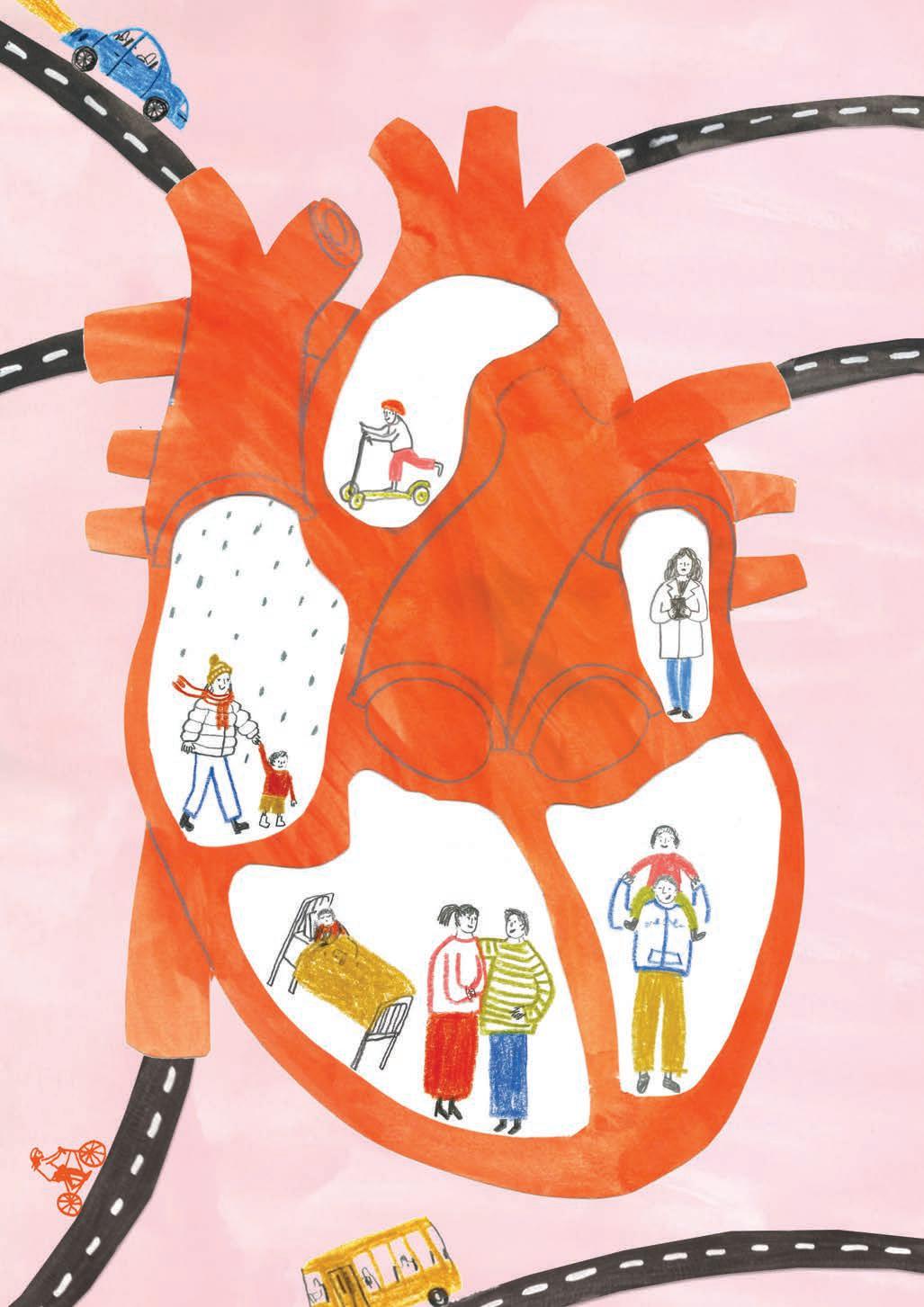
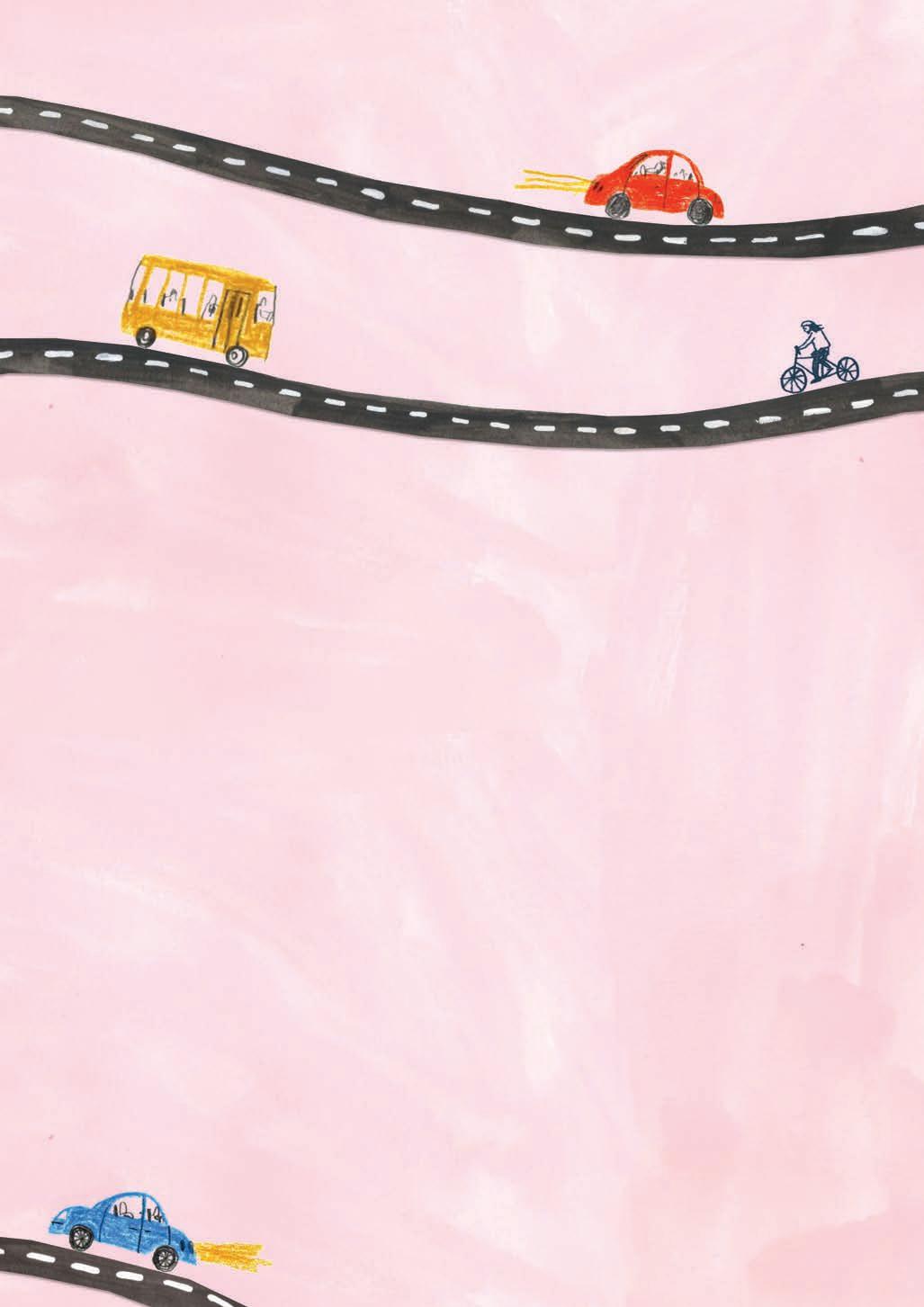
Welcome to the suck, the heat pump, red pressure pressing from the right-hand passing lane tunnel exit of lungs to the on-ramp le ventricle, quick pitstop through the aorta, Cupid’s answer to the tricuspid valve in a surge like an arrow shot over the West Hills into the unincorporated valley of suburban Portland, May, 1979.
My parents make the drive again and again for consultations with pediatric specialists, cardiologists, maybe a nip of gin a er the appointments to allay their fears.
Of the doctors’ meetings, I have no memory, yet of the days before and a er the surgery, I can clearly see the pale green walls of the hospital room, the IV, the beeping.
I am nearly three, hand big enough to hold a dime, two hands clasped together roughly the size of my dysfunctional heart.


I sneak another look at her, quick and nonchalant, in case she wakes. What could be worse a er a rst night with someone than to wake up and nd their overkeen face staring down at you? But I would drink her in if I were a braver man. I would savour the way the beam of bu ery sunlight through the curtains creates golden highlights on her smooth olive skin; the way her eyelids u er gently as she breathes, as if she’s enjoying the most blissful of dreams.
I sti e a laugh as I register my thoughts; one night with this goddess has turned me into Lord ipping Byron. I still can’t believe it worked.
My throat clogs with unfamiliar emotion as I carefully edge out of bed so as not to wake her. I need time to get myself together. She needs to wake up and see the con dent alpha male that won her over last night. My usual awkward, pathetic self will not, I fear, pass muster for a second date.
Turning on the oven for the croissants I’d bought on a whim, just in case, it strikes me that perhaps I should check in with Gav, my mentor on the course. He’ll know what to do next to impress the angel sleeping in my bed. I take my phone into the bathroom.
“Gav?” My whispered voice betrays my pride and eagerness as his, sleepy and discombobulated, answers my call. “I did it, Gav. I got one.”
It takes a few minutes of back and forth to remind Gav who I am and what I’m referring to but he snaps awake at the realisation that there’s a real live, breathing, beautiful woman lying in my bed and it’s all thanks to him. “Fucking hell, mate. Well done.”
“So what now?” I’m pacing, impatient to hear what’s next.
“Erm, I dunno mate. I guess you’ve done it now. You’ll be able to use your skills again next time.”
I hesitate, I don’t want to go out and pick up more women. I want to know how to keep this one.
Gav obviously picks up on my reticence. “Did you do the peacocking?”
“Yes.” I’d worn a purple hat, feeling like a total bellend. But it had worked, she’d come over and commented on it.
“Did you neg her?”
I sigh. “Yes.”
I didn’t feel good about it, but I’d told her she was pre y smart for a hairdresser and had quite nice legs, despite being so short. Both times her face had registered confusion and a li le sadness behind the smile, but she’d grown keener to impress me.
It depresses me a bit that it worked, but it did.
“ at’s it then mate, just keep on keeping on.”
I hang up, realising Gav doesn’t know any more than I do about mature adult relationships.
I wonder, dare I risk coming clean, showing her the real me?
No, I decide, reaching once again for the purple hat.


When she calls in the morning I’ve changed my number address identifying features I’ve sacri ced my name when she calls in the morning With news she’s selling my teeth on eBay e teeth she broke o One by one While I was sleeping that is a lie when she Calls in the morning I was awake Each time she whi led away my ability to bite Once on VH1 in a thrash metal rockumentary that is a lie It was at the Kentucky Derby when she calls in the morning She’s taken all my hats and next my hair and my scalp is an angry red gash Once eating to ee by the sea that is a lie When she calls in the morning it was a rest stop In Jersey and the assortment was unreal And of all things I chose Dentyne
Once I knew all the lemon drops by names And identifying features they had names When she calls in the morning she wants the children When she calls in the morning and then the house and the hospital where they won’t operate on me ere are no spare parts not even a space between Whistling
Like a st of the bank in wet Season lying through her teeth
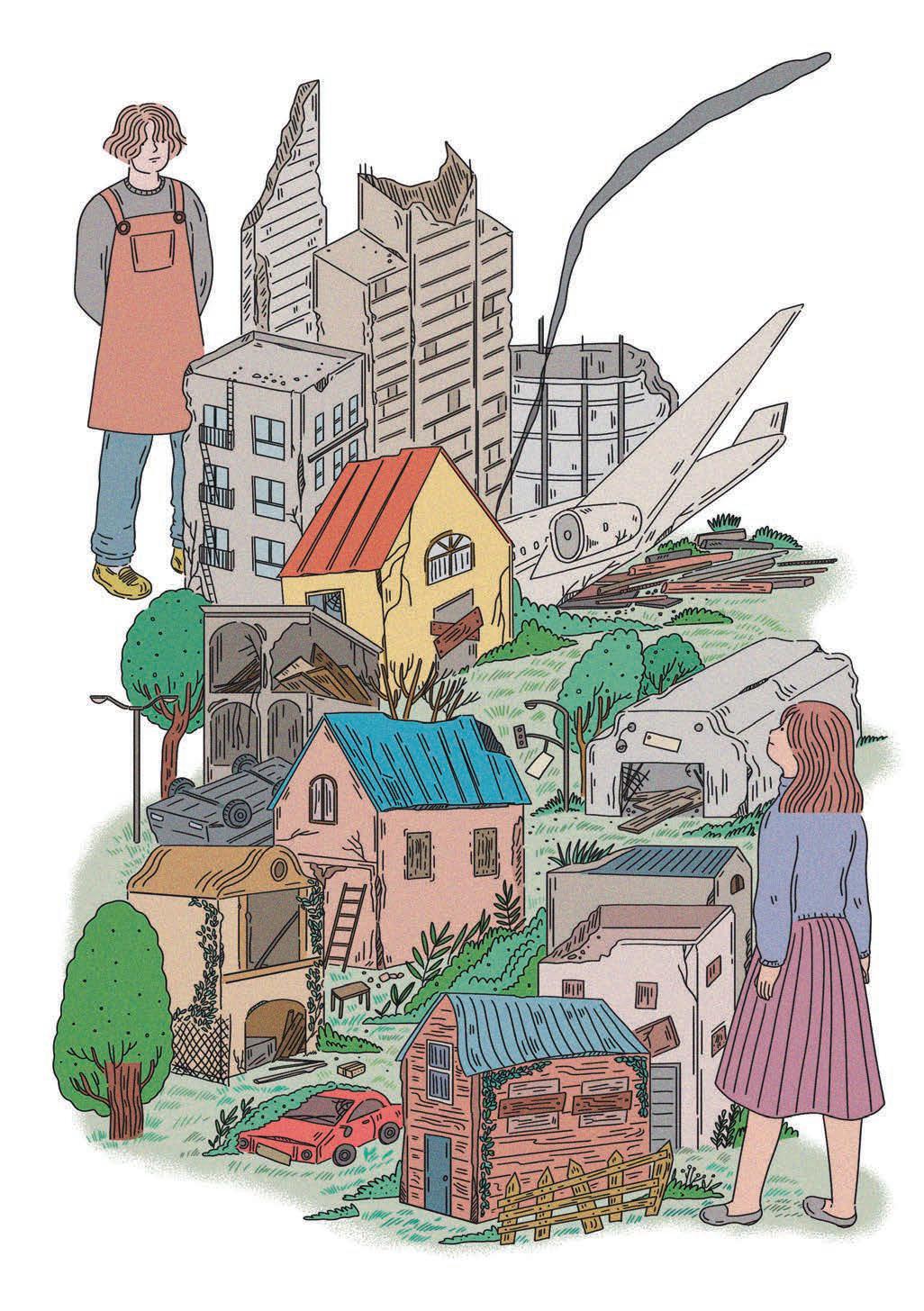
Flash fiction by Emmaline Stoddard Illustration
by Joyce ChoHello, I am calling from the End of the World Matchmaking Services to congratulate you. You have been matched with a man only a four days bike ride away. Unfortunately, this man is one of the ones you explicitly stated on your form as not wanting to be matched with. We know you went on a terrible blind date with this man ten years ago and referred to him to your friends by saying, “If he were the last man on Earth, I wouldn’t go out with him.”
We know he is not, in fact, the last man on Earth. Yet you two seemed like a good genetic match for the future, and all the other men are ge ing matched with other women.
Right now, he is thirty-two. His hobbies include making felt hats for his cats and playing solitaire. He wished he travelled more before the apocalypse but he never had enough money to do so. He would describe himself as a curious introvert who is glad the world ended because now he will be in a commi ed relationship. Oh, sorry, forget I mentioned that last part. He’s not desperate for love and a ection at all.
I’ll give you a li le run down of what has happened to him over the past ten years. He nally found a job as a grocery store clerk before ge ing red and nding a job as a pizza delivery man. He continued to collect rare postcards from the early twentieth century, spending a large portion of money on a 1907 Kansas City postcard with its original stamp. He acquired two more cats bringing his overall total to four, one of which is the one who bit you ten years ago. And he’s been on a handful of dates, none of them progressing into a serious relationship.
Do you have any questions for me about this arrangement?
No, we started to match them rst because of the rst le er of their last name.
Yes, there were fewer options by the time we got to the end of the alphabet. But we also determined that you two were a good genetic match while looking towards the future of our society.
I don’t know the exact genetic markers that we matched, but I could send a report to your residence in about three years. It could arrive sooner if we manage to nd more paper, more electricity, and more manpower.
Well, you can’t really switch who you’re matched up with. Everything is pre y set now.
e other options included ex-convicts, technically current convicts because the jail system has broken down, and fast food mascots.
No, they never learned how to cook the food there so they can’t make you burgers and fries. ey’ll convince you to buy some but there’s no place now to do so.
He said he would bike to you.
Yes, he owns a bike. He found one, I should say, a er all those people died in the apocalypse. Yes, he is also bringing his cats.

I’m sorry, I can’t stop him from bringing them. I also can’t stop him from wide-eyed staring at you and talking about “fun facts” (in his opinion) about the Progressive Era in America.
He’s going to move in with you. Even though there are more houses available now that all those people died in the apocalypse, he thinks your place of residence is nicer than his. You will have to make space for him and his cats in your home.
No, this is not a temporary situation nor a prank phone call. He is coming to live with you and start a family so that our society doesn’t die out completely.
He may already be on the way to you.
At this point, the future of the world is at stake. We all have to do things we don’t want to. Do you really think I want to be stuck here making these phone calls?
I understand, I wish it hadn’t come to this as well.
ank you for doing your part. If you have any more complaints, please do not reach out to me with them as there is nothing I can do. Have a great day!
If you would like to participate in our survey, please press one.
“You can’t really switch who you’re matched up with. ”
e blood stains on the knife made it hard to nish my Sunday roast.
Shoving the apron in the black bag, and wiping him o the photos on the fridge, I looked at the mess I’d made and tu ed.
I positioned myself, two feet on his torso. A game of tug of war between me and his ring nger. at single loop of gold would tie me down, an anchor in the autopsy.
I hear my giggle bounce like a blade-edged boomerang. If there’s anything le for the autopsy.
I placed his forearm in the pot, pushing aside the roast potatoes, and threw his liver to the boys. At least I don’t have to pick up dog food this week.
I’ll grab the mop from the bathroom in a bit, and take a drive to the dump on Tuesday. Reminder: nip into Lakeland to get a new meat cleaver.
Pleasantly pleased with my hard work, I smirked, wiping his remnants from my dimples, now wearing his heart on my sleeve.
It was late into Sally’s shi when the deer arrived. Not a deer in its entirety. Parts of a deer, inexplicably holding together in a form that was more-or-less recognisable. e antlers were intact, and perfectly magni cent, but the face and body were withered down to practically their skeletal form, with what remained of the skin draped across like a depleted dinner jacket. A deer skeleton in a deer skin did not quite total a deer, but it was a valiant enough a empt.
“I want to see Mr Lovick,” said the somewhat-of-a-deer.
“Do you have an appointment?” asked Sally. “Clients usually call up in advance.”
“I did try giving you a ring,” said the deer, li ing up a visibly scu ed hoof. “But as you can imagine, I had rather a tough time gripping the receiver with these things.”
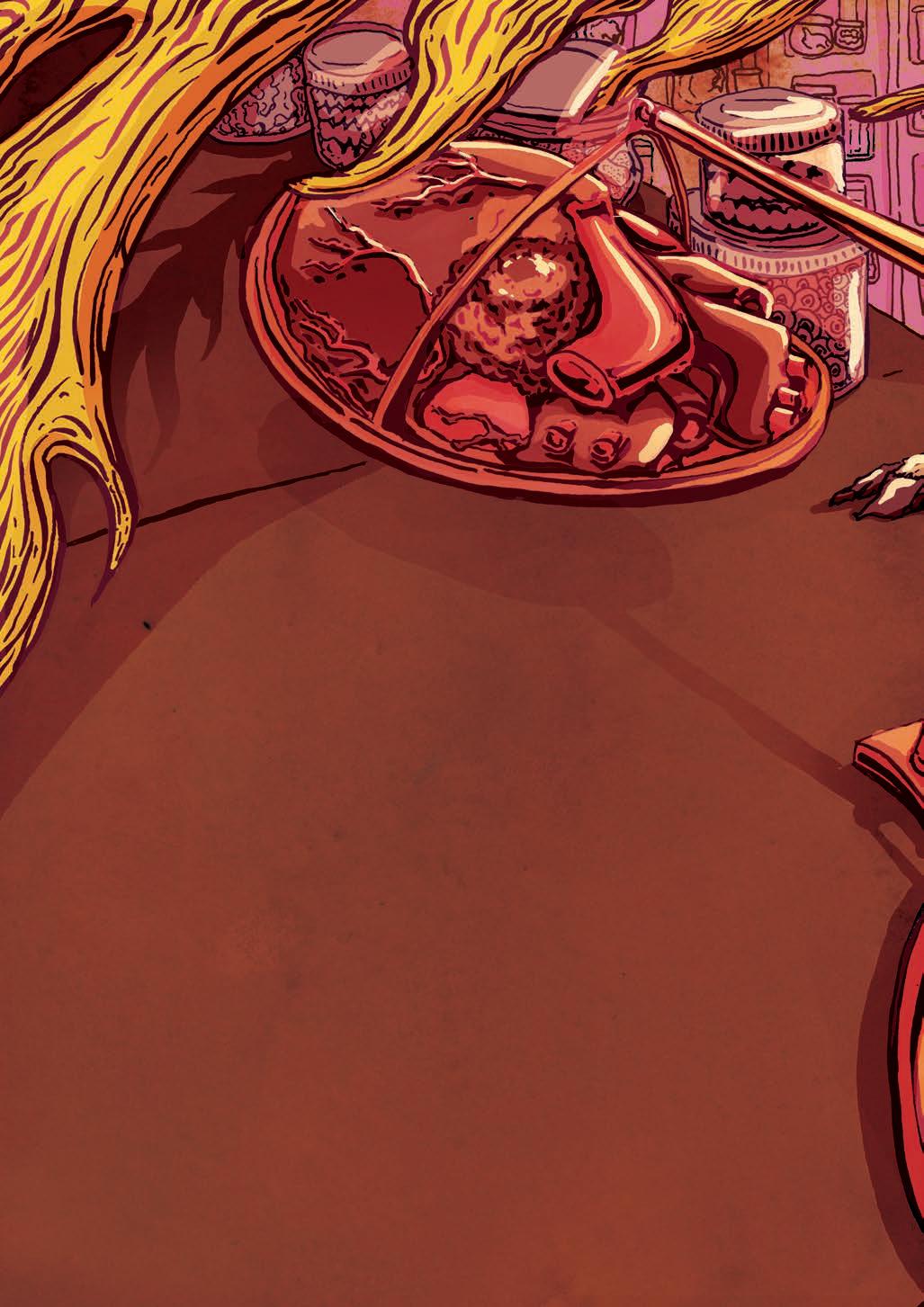
Sally reached to the corner of her desk, retrieving a memo pad and ballpoint pen.
“I could pass a request onto him, I suppose. May I ask what you’re here for?”
“I need him to give me a new heart,” said the deer.
Sally inked a scrappy heart symbol beneath what she’d intended to be a pair of antlers, only on re ection they looked more like television antenna, ba ered from a turbulent storm.

“I see. And would you mind telling me what became of your old one?”
e deer managed a vague frown with his emaciated facial features. “Long story short. A fox ran o with it.”


“A fox did all of that to you?” Sally asked, pointedly, determined that his story not be short.
“Of course not. A lion did it, mostly. A terminally ill lion, but he still had a remarkable amount of predatory me le le in him. He’d called me over to discuss the management of his a airs a er his passing, and a er a while it dawned on me that this might all be a ploy to get me liquored up to the point I’d be easy prey. And then when the lion lunged at me and took a piece out of my ear…well, that con rmed it. So I legged it pre y swi ly.”
“ e sensible thing to do,” said Sally.
“Yes, only a erwards his assistant, the fox, came over to convince me that it had all been a terrible misunderstanding and that, if I came back, they would make it up to me. Else elect a leopard or wolf as bene ciary in my place. And I thought, well, maybe I had just overreacted. Next thing I knew I was lying at on my back with a split down my abdomen, and that lion clawing through a heap of my internal organs a metre or so away.”
“Worst feeling in the world, I’m sure,” Sally murmured.
“You haven’t heard the worst of it. e lion was all upset because he couldn’t nd my heart amid that heap and was demanding to know what became of it. It was as clear as day that the fox had taken it, yet that smirking tod had the gall to respond by asking what kind of heart you could expect to nd in a creature who’d have met with them a second time. A ne friend to his terminally ill master he turned out to be.”
“How unpleasant,” said Sally. “And are there any organs le in you at all?”

“ ere can’t be many. I think I’ve still one of my kidneys in here. e bulk of it, at any rate.”




“And the brain?”
“Oh yes, I’ve still got that. ey never checked inside my head.”
“And it’s just a heart you’re a er?” asked Sally. “Rather than those other organs you lost?”
“It’s the heart that hurts the most,” replied the deer. “ e lion only robbed me of my lungs, my digestive tract, and a handful of other things. e fox, on the other hand, robbed me of the very essence of my being. Not so much by taking my heart, you understand, as by denying it was ever in me in the rst place.”
“You appreciate, of course, that whatever heart Mr Lovick could supply wouldn’t be the same as the one you had? at you’d be ge ing the essence of someone else’s being?”
Sally was reluctant to tell the deer then and there that most of the hearts Mr Lovick tended to have in stock had been pawned by stoats and raccoon dogs looking to satisfy a gambling or substance addiction, and ultimately abandoned by their owners once they’d decided that a heart was a luxury they could get by without.
“Not important,” said the deer. “All that ma ers is that I’d be able to pu out my chest with pride, should I happen ever to pass that fox again, and let him know that his evil deed and his evil words could not deny this heart in me. He’d have a pre y clear view of it too, thanks to the number of ribs his companion broke.”
“Next question,” said Sally, sketching an equals sign beside the misshapen heart on her memo. “How are you intending to pay for this new heart of yours? Do you have anything in
“The lion only robbed me of my lungs.”
mind to o er for payment?”
“Good question. Would Mr Lovick be interested in what’s le of my kidney?”

“I don’t suppose he would be, for a heart.”
Sally scanned the deer from top to bo om.
“You might have more luck if you o ered up your antlers. You could try just one, but Mr Lovick would be more agreeable to the pair.” e deer shook his head.
“I couldn’t o er both of them. Do you appreciate how much of my status I have invested in these antlers?”
“I was under the impression that they grew back, eventually. Which is more than you can say for a heart, you know.”
“I’m not so convinced that mine would grow back,” said the deer. “My body’s had so much wrenched out of it, I couldn’t tell you what it’s capable of anymore.”
Sally thought for a moment.
“You said your brain was still all there, didn’t you? Mr Lovick would potentially be willing to trade out a heart for a functioning brain.”
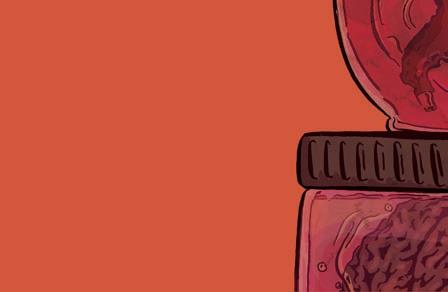
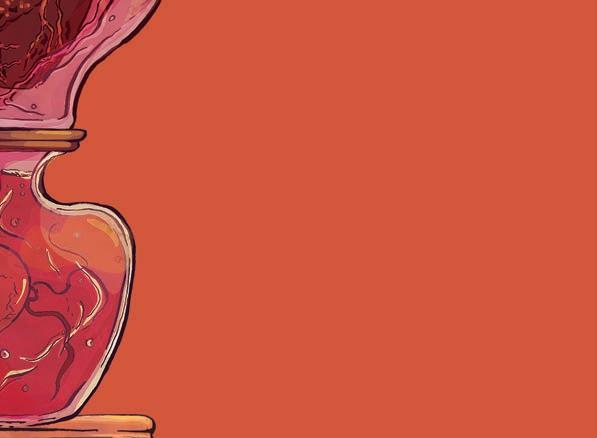
She began sketching a vague, cloud-like symbol beside the equals sign, when another thought occurred to her and she abandoned it midway.
“Although, given the circumstances under which you lost the rest of your organs, he’s likely to suggest that your brain is defective. In which case, he’s going to want more for a heart.”

“What do you mean, defective?” e deer was quivering. “It’s always been a perfectly ne brain as far as I’m concerned.”
“It’s just that it didn’t stop you from going back to that lion a second time. If it had, you’d still have your heart, and everything else, except perhaps for that one piece from your ear.”
“I didn’t go back because my brain was defective, thank you kindly,” the deer snorted, sliding a scu ed hoof against the oor, just aggressively enough to cause a slight squeak. “I went back because I had too much heart. Don’t you get that? I couldn’t bear thinking I’d upset that in rm old lion. A crueller irony could not have dribbled from that thieving fox’s tongue.”
“From Mr Lovick’s standpoint, I’m not sure that’s going to wash,” said Sally. “You might be able to convince him it’s a good enough brain for a heart. But I suspect he’ll demand an antler on top, likely both.”
She nished sketching her cloud-like squiggle, put a question mark in the centre, then an arrow redirecting the mangled television antenna to their new place in the equation.
“Hearts are expensive, I’m afraid,” she added, pondering the likelihood that the heart in question had previously belonged to some solvent-sni ng stoat. “Although, might I make an alternative suggestion? Instead of trading your antlers for a new heart, have you ever considered growing grapes across them?”
“Not much of a substitute for a new heart, is it?” asked the deer, his skeletal face lowered.
“It is if you’re looking to spite a fox,” Sally insisted.
“How, precisely? I told you that antlers are a tremendous source of status for a deer. Can you imagine how ridiculous I’d look, with great big bunches of grapes hanging o them?”
Sally shrugged. “You gure it out. You insist that your brain isn’t defective, a er all.”
She excused herself for a co ee break, while the deer turned the ma er over and over in his unopened skull. Somewhere within, he found some half-remembered allegory about nothing tasting quite so sour as a commodity perpetually out of reach.
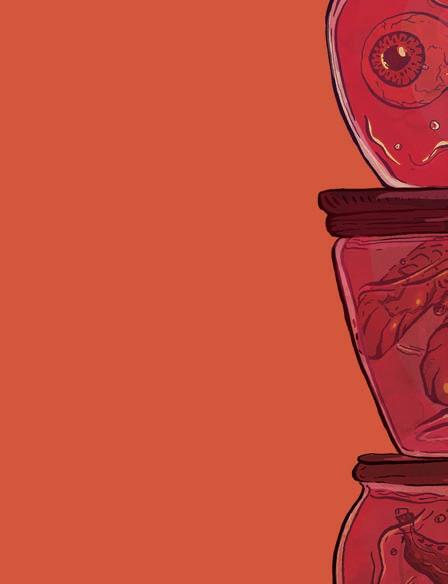

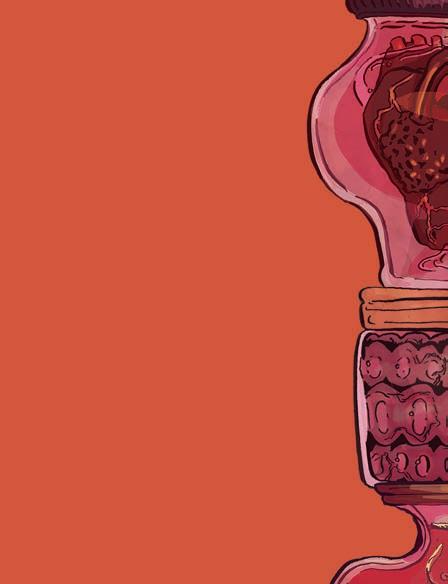
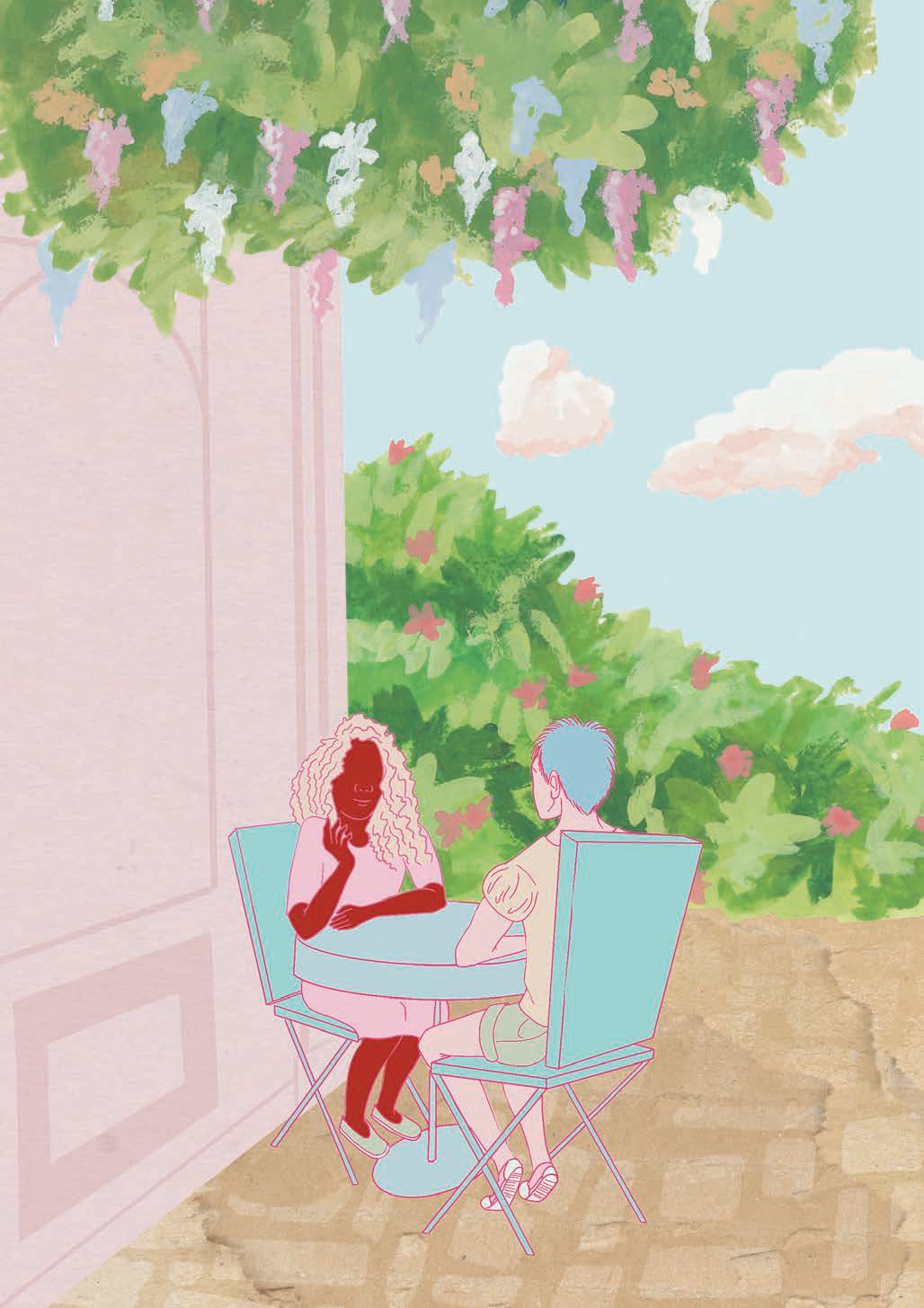
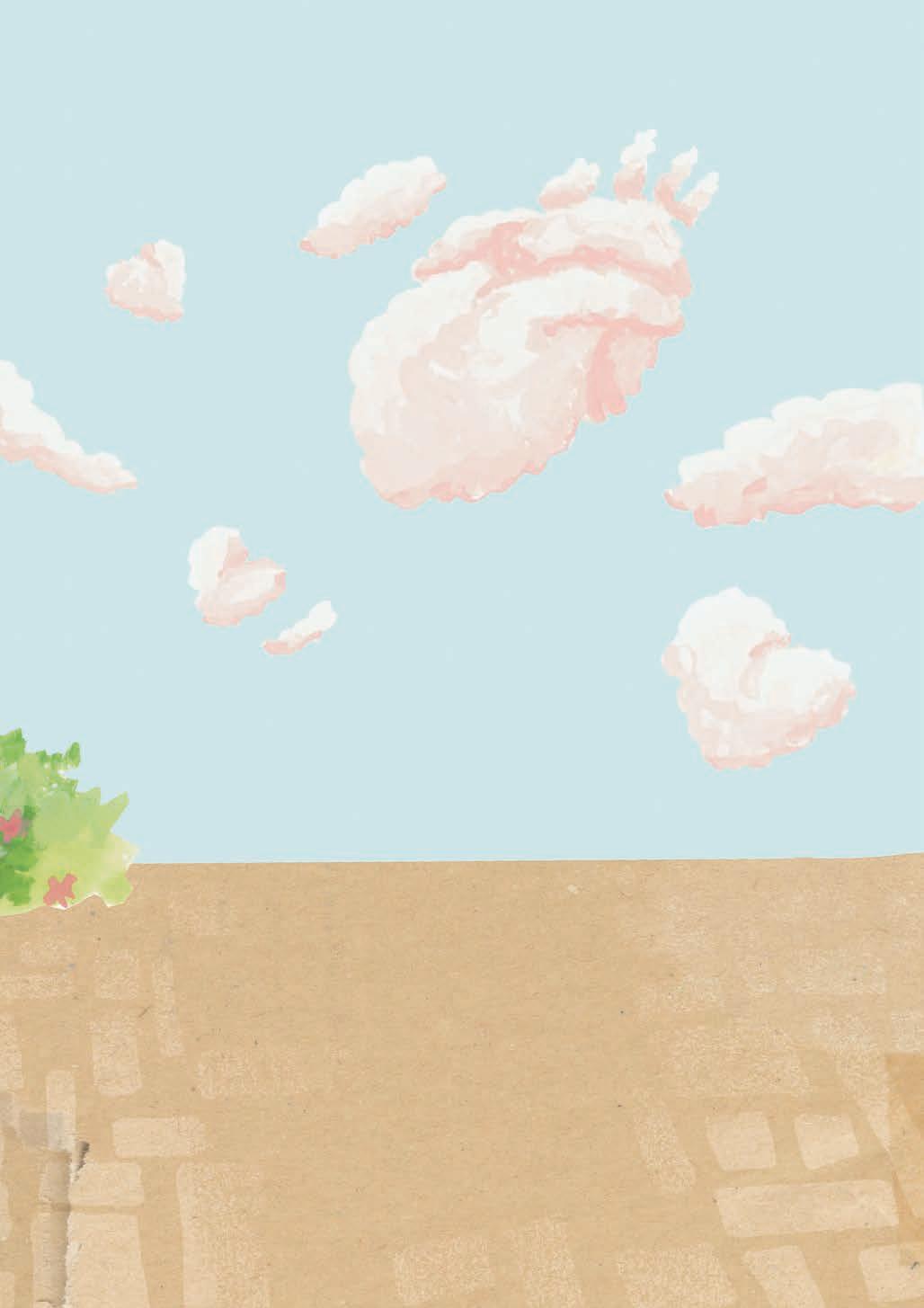 Poem by Neil Laurenson Illustration by Katie Coward
Poem by Neil Laurenson Illustration by Katie Coward
Did you know that the heart is the size of a st? I’m not a cardiologist, I’m not an expert by any means though I know that heart cells contain proteins. It’s true. Hearts are consumed as food. Sorry, you look like you’re in a bad mood. Is it too noisy? Don’t you like the venue? at’s good. Let’s see what’s on the menu. So…you know the myocardium? Pardon? No, I don’t think you’re dumb. I’m not for one minute suggesting I’m smart. I’m just intrigued by the workings of the heart. I know you know all this stu too. (Please don’t leave. I love you.)
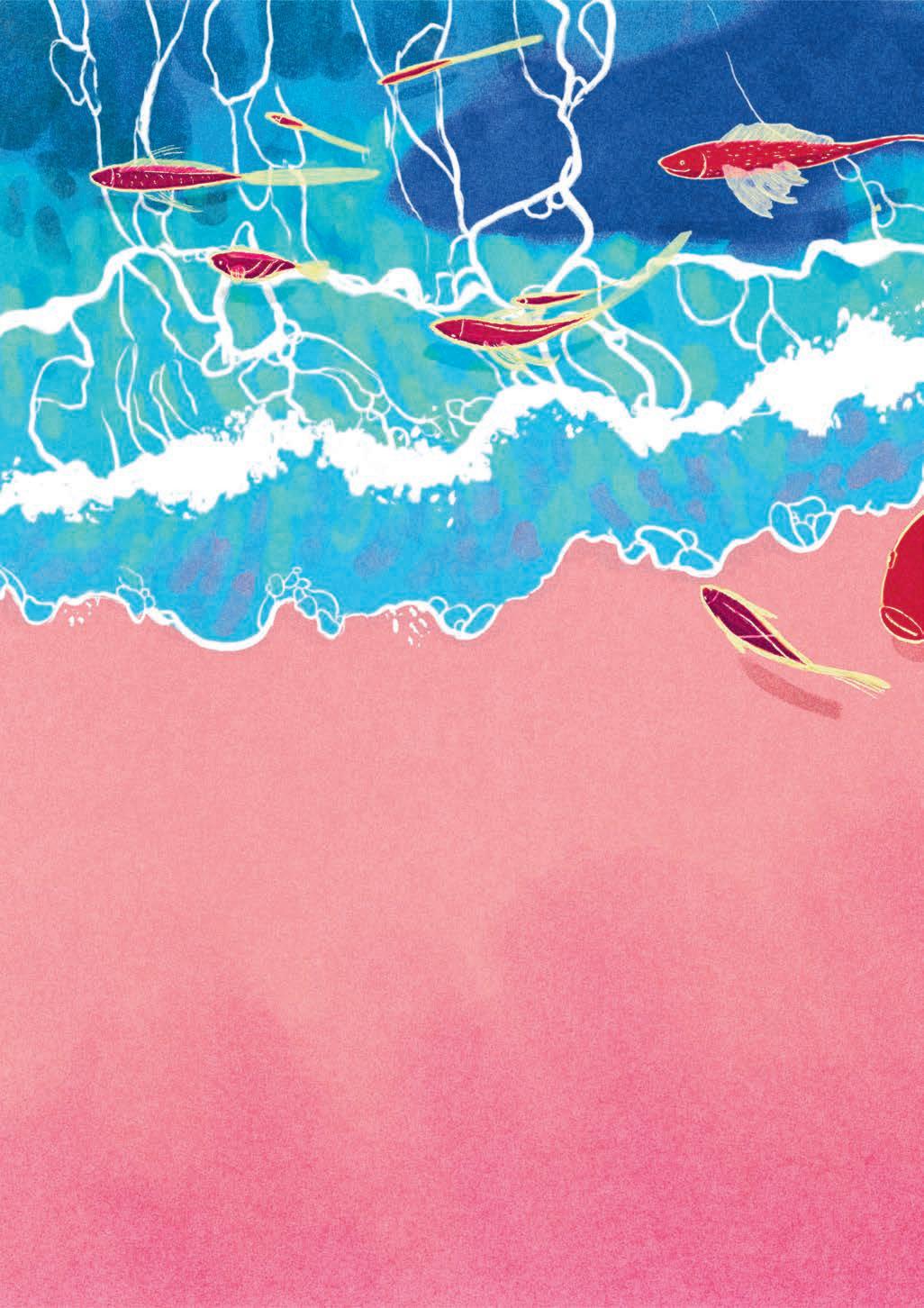
My mother was a cardiologist and a drunk. Not the nasty kind of drunk, but the sad and pathetic kind. Before she died of acute liver failure she taught me two things. e rst thing she taught me was that if you want to quit smoking, you have to swear an oath to God. en consider the temporal and spiritual consequences of breaking that oath. en buy a pack of mints. Every time you want to smoke – “and I mean really, life-or-death need a cigare e” – you suck on a mint instead. By substituting Marlboros for Polos you can get through the rst few weeks. A er that, you’re home free. e second thing she taught me had to do with love.
*
My father is a ghost. He was long gone by the time I was old enough to remember anything, but he le shades of himself about the house: a collection of unfocused photos on the staircase wall; the stew pot and tagine that Mum never used; the black-and-yellow climber’s rope looped from a hook in the bedroom like a waspish lasso.
My big sister Maggie remembers him, faintly. He had been tall (even to a four-year-old) and lithe with vaguely botanical-looking muscle that came from climbing. But she remembers him seeming otherwise frail. He probably wasn’t older than forty at the time. Documents found

a er Mum’s death showed that he had a congenital condition – a hole in the heart, between the atria – that meant he became increasingly out of breath, lightheaded, prone to fainting. Possibly this was how our parents had met.
It was also how they separated; via that porous membrane between worlds, the grey veil that makes people gone even while they haunt you.
*
e second thing Mum taught me had to do with love.
“You can’t control it, so don’t try. Let yourself make mistakes, but learn from them. ere are plenty of sh in the sea, but there are also plenty of sharks. It won’t always be good for you. But in another way it’s both good and bad for you, at the same time. Don’t in ict your issues onto the people you love, but show kindness when people in ict their issues onto you.”
Which is to say, she didn’t really teach me anything.
“But in another way, she taught us everything,” Maggie said once, in a perfect imitation of Mum’s voice.
Calm, low, wounded.
*
Mum told me once, whilst deeply in her cups, that she starting drinking as a coping mechanism for her job. Eventually she quit smoking, but the drinking was harder to kick. Some outlets are simply more e ective than others.
She explained, “When you’re a heart surgeon, your patients always die.”
Not strictly true. Usually, they le hospital much healthier than when they went in, with freshly stented arteries or a strong new heart. But the underlying causes would typically remain. Fa y diet, substance abuse, the incurable anaemia or autoimmune disorder.
“Eventually they’ll miss their check-up,” Mum rasped. “Because they’ve dropped dead.”
Pu ing it that way, every relationship is a failure – until the one that lasts. e one where you die before it can end.
Maggie would slap my arm. “Oh, you gloomy git!”
And I would reply, “Am I wrong?”
*
A er my divorce, I accepted a lot of bad advice from well-meaning friends. Talking therapy has helped me with other issues, but not the separation. Going on about it made it linger in the air like cigare e smoke. It made me feel like I was hanging on, addicted –just breathing it out and sucking it back in again. It made my lungs tight.
Observing Mum’s slow decline into organ collapse soured the idea of ‘painting the town red’ from an early age. In fact, that was one of the reasons cited for the breakup: being u erly unfun.
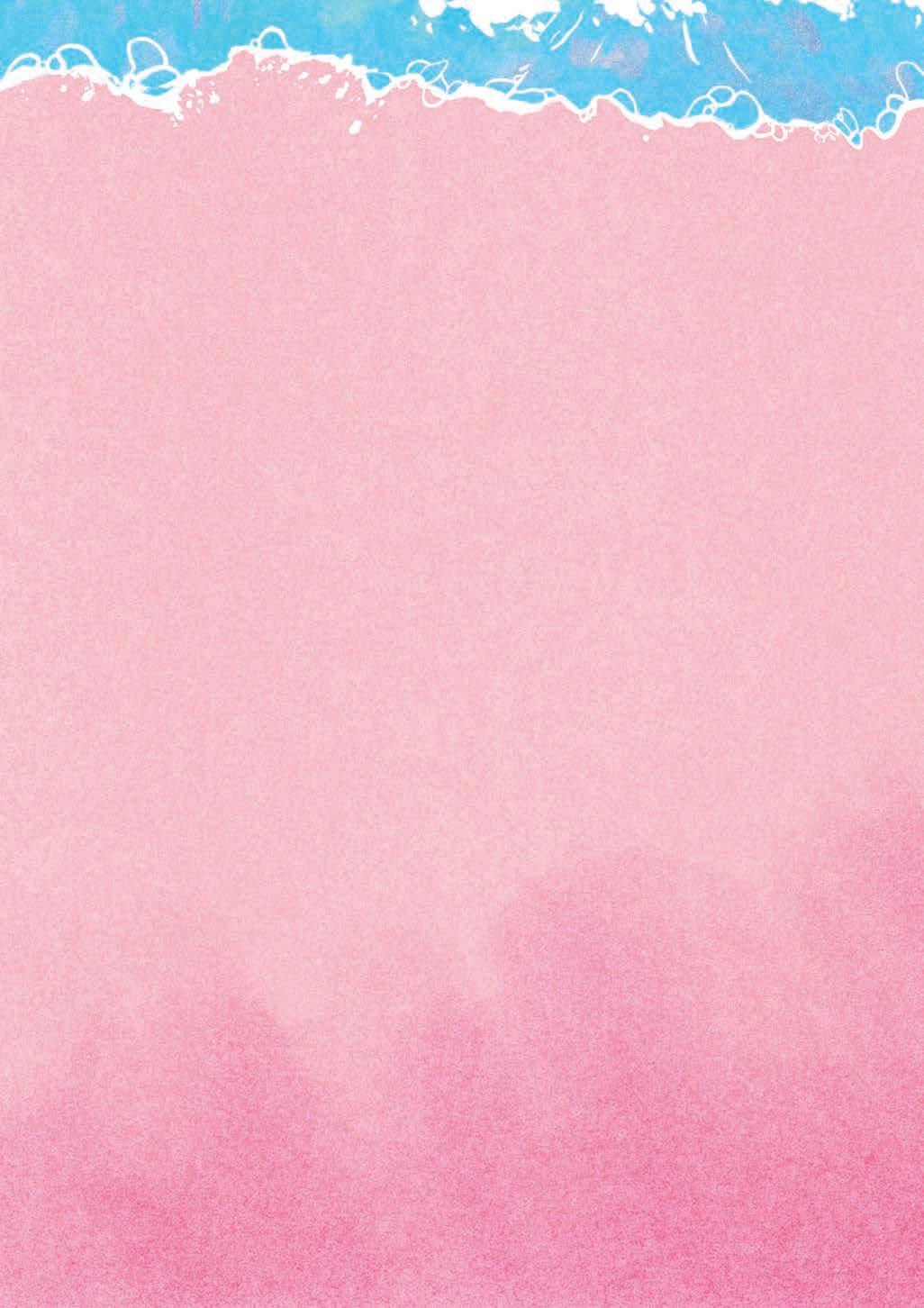
“She had a bit of a point,” said Maggie. She would say this sort of thing whilst stealing one of my French fries, or gently signalling that the shirt I was picking out was too ugly. Casually steering me, in her unfailingly way, back in the right direction.
Maggie’s advice was to start dating right away. Find someone who was a be er match for me, erase the bad taste in my mouth.
“Like sucking on a mint?” I suggested.
She smiled at the reminder of Mum, a li le sadly. “Actually, this shirt could look pre y good
on you.” Taking it back o the rack again, as though maybe she had judged the apparel too harshly, or maybe she wanted me to look bad. Sort of a thank you, sort of a fuck you.
*
To date so soon a er the divorce was also bad advice. A er a few false starts I met a paralegal who was smart, funny, but a li le cruel in her ridicule of others. I was reminded of the sharks in the sea amongst all those sh.
“It’s not like when we were younger,” said Maggie, downloading one of the less-hellish apps for me. “If you’re going to date nowadays, you have to be one of the sharks, or someone will take a bite out of you.”

“How do you know I’m not into that?” I teased, lopsided grin and all. Occasionally I threw her a curveball, to see if her snippy charm could keep up.
She turned my phone to me as she deleted Bumble and started downloading Tinder. “If you say so, Bruce.”
*
Soon a er the funeral, we sorted through Mum’s house. Among the boxes of hospital records, certi cates, greetings cards, and printed photographs in faded envelopes, we found some love notes. Maggie and I, si ing cross-legged on the threadbare carpet of Mum’s bedroom, passed them back and forth over the heap of documents in amazement.
I think I intentionally failed to commit any of the notes to memory, but the vibe was overwhelmingly warm: thank-yous for kind gestures and gi s, sweet nothings sent during extended times apart, and post-reconciliation scraps of smut. It some cases embarrassing (to me, at least), but sweetly beautiful. e heartfelt scribblings of a couple in love. is concrete proof of their intimacy seemed to jar with my understanding of their relationship. I’d painted this unwed couple as being unromantic, ma er of fact. eir partnership marred by sickness and alcoholism, itself diseased. eir memories of each other made bi er by grief and remorse.
But they had tolerated each other’s aws with kindness. Mum kept the worst of her insobriety to herself. She held to a discreet drunkenness in those days. In return, when they could no longer hike and climb together, Dad concealed his ailing body and supported her in other ways. To be the primary cook was only one example hinted at in the notes.
Except for the rope on the wall, they had seemed unsentimental about the short time they’d lived together. ree years, just long enough to see two siblings born. ey practically knew he was dying before they even got together. So why bother?
Asking that question was one of the times I truly upset Maggie. She kicked the sca ered papers aside as she sat up, and went to fume silently in the kitchen as the ke le boiled. e maudlin, near-empty kitchen, its walls stripped bare, its crockery loaded into crates for a charity shop, the unexpected tagine le in astonishment on the breakfast counter.
When I heard hot water being poured carefully into the mugs, I ventured down to join her. We sat on stools at either side of the counter, silently enjoying our vices. Sipping on the hot bi er ca eine, working our way through Mum’s last, un nished pack of cigare es.
Good and bad for you, at the same time.
“You have to be one of the sharks.”
I am the animal who lives in your chest the thumping back legs of the snowshoe hare bounding over snow- urried elds chasing tailwinds, blustering gusts, upli ing air. Blood pulsing nimble, I navigate trails looping for bark, shrubs and grasses, ear-tips tu ing from point to point seeking safe ground. Be slow, lie low, until ght and ight take charge my two hind feet kick start and I’m stu ed inside your mouth panting. Calming breath, u ering back inside your chest, pounding down to pumping, I’m nestling in rib basket. Beating now at normal resting rate, snowshoe hare huddling in the underbrush.


His heart sang when he heard his rst skylark of the year. It was his favourite sound. Many years from now he suspected a billion nano-bots would be helping to keep his bioengineered body alive onboard a hulking space freighter, but for most of the four million year journey from the wasted planet Earth to the new home-world, he would be in cryogenic suspension.
To keep his subconscious stimulated, as he dri ed through time and space, he’d have programmed his stasis pod to play recordings of skylark calls. One day the ship’s computer would wake him and he’d step on to the grass of a new planet. e sights and sounds of nature would envelop him. Impossibly beautiful multicoloured birds would sing impossibly beautiful songs as they danced across a binary-sunlit meadow – and he’d blast them out of the sky with his laser.
Four million years of bird song made their sound unbearable. He’d keep blasting until there were no birds le to blast. en he’d hear it – a skylark. He’d follow the sound for days without rest, until nally he clutched at his chest and fell.
e call of the skylark would vanish with the last beat of his heart.
He continued on his way up the hill, listening to the skylark as its song radiated through the air overhead. He felt guilty, and decided that when the time came to enter his stasis pod he’d programme it to play whale sounds, or maybe some Enya.

I was born with a broken heart. Quite literally. It was full of holes and the blood would sip from one place to the other without rhyme or reason. I wouldn’t stay alive for long with this Swiss cheese of a heart. So I went to the hospital with my young parents and magic hands stitched the holes, most of them anyway. So I could live.
It took patience and dedication. It was scary and long.
It wasn’t easy either. For them or for me. I sometimes wonder if I really wanted to live this life, this human life. But I stayed. For them, and maybe for me. And now my heart is a li le bit bigger and a li le bit stronger than other people’s hearts. It has to be. Keeping me alive, and them too. Pumping blood that doesn’t always go where it’s supposed to.
Since then, it hasn’t been a walk in the park. People have tried to steal my heart. I don’t blame them. A heart like this is precious and rare. But when they took it behind my back. I had to ght to get it back. Every time, the holes were back. And I didn’t have magic hands to stitch them back. ere was blood, there was pain. I didn’t want that again.
So it became a run in the park. Running away from the thieves and their greedy hands. Until I ran out of breath and had to get rest.
I found a tree I could sit under, to protect me from the weather. I tried to catch my breath and mend my heart. I didn’t know what it would take. I didn’t know what was at stake. For a li le while, I didn’t want this heart. I didn’t want these wounds, this pain. I resented being human, in this body, in this mind. I wanted a “normal” heart, no holes, no stitches, no pain. Wasn’t it what it should always have been? Wasn’t it supposed to be more beautiful than this? I couldn’t believe that hearts were just meant to be broken.
I had a long cry, and sat there for a while, watching people pass by.
And then I started noticing, a lot of them seemed to be weary, like they were carrying something heavy. Was their heart as heavy as mine? What did it mean to be human, in their hearts and mind?
Maybe they weren’t born with a broken heart. Maybe theirs weren’t as vulnerable as mine, but they certainly weren’t immaculate the way I had imagined. ey were a li le broken too for sure.
I wondered… Could it be okay that it was this way? If there was no ‘normal’, no ‘unbroken’ then where was the beauty to be found? Where was the light in our human condition? Was there any?
On my own, I had imagined I was the only one in pain. e only one to feel the shame that comes with believing I am the problem. I was not. Not the only one. Not the problem.
Maybe their pain felt di erent. Maybe their wounds didn’t look like mine, but they knew the pain of a broken heart. ey knew what it was to be human. A million di erent ways. And maybe this is it, the beauty, to do it together. To be part of a community. A community that chooses to be human, when then could choose to be so many other things. A community that hurts together and know the pain will fade. A community that creates the beauty they want to see. It isn’t easy to be human. And more o en than not, it breaks my heart. More than I could say. But in the rubble, sometimes, there is magic, like the magic living in the hands that stitched my heart. And made me stay alive. Scars, holes and all.
I am human, and that is ne.

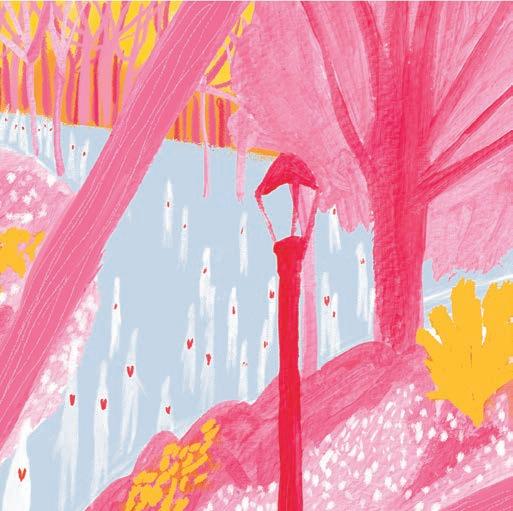



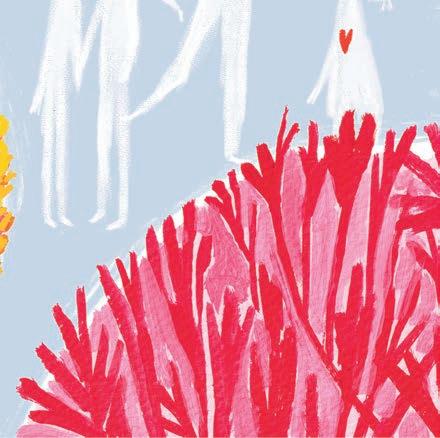
 Poem by Emmaline O’Dowd Illustration by Milena Muszynska
Poem by Emmaline O’Dowd Illustration by Milena Muszynska

Fine white veins incised through thick blue glaze trace coiling dragons.
A careless duster-stroke and the lid falls. Her eye catches it, her hand, just too slow,

sees it smash on the hearth, explode six ways –at least, there should be six.
She hurts with the broken faith of it but he nds the missing piece, o ers to glue it.
He could make it complete, but of course never again perfect. She’d rate it be er than that,
given the value his lovingly mending it would add. He’s clever like that –made the heart she let fall a cradle of new muscle –you can hardly see the joins.
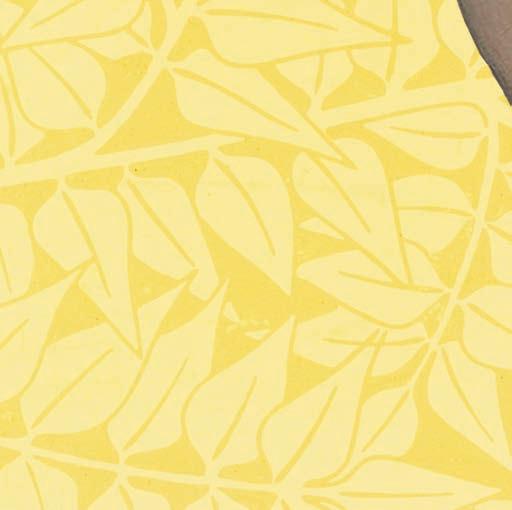



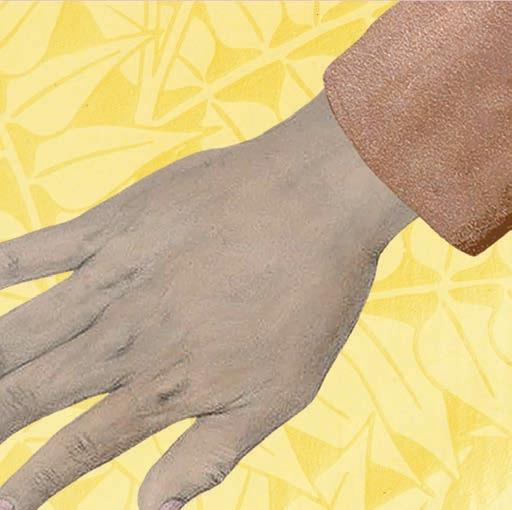
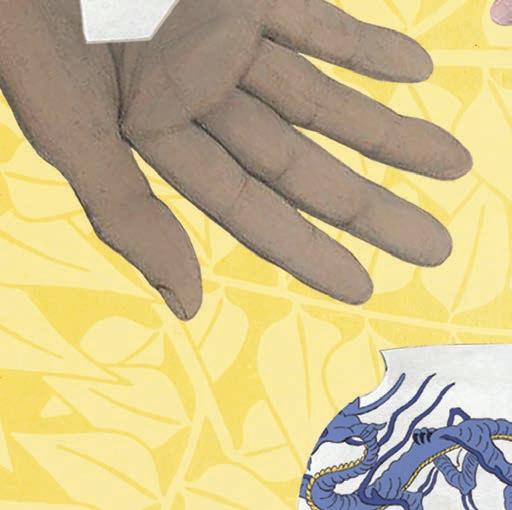

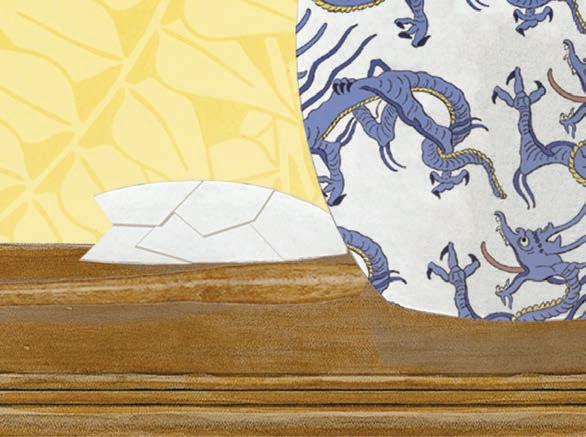




It’s the last night of the festival and I have a bucket of wings. Pizza, red wine, sandwiches hold sway on other blankets spread like stamps on the hillside. We gulp and chew away the evening. A crust of darkness covers us, but our heads poke out as from stargazy pie. We look up. We watch you and the orchestra, the bin men of the cosmos, bringing us the brilliant casto s of re, space, and time.
For you, this is the twenty- rst year. You’ve seen recessions, strikes and new directors, cutbacks, cancelled tours. You’ve felt the recoil of broken strings, the spray of sha ered batons. You’ve stepped honestly up the rungs and here you are on top.

But tonight will mark the end.
Two years ago, your joints froze in the middle of Dvorak’s ninth. ey melted quickly. Six months later, vibrato became painful. You started popping Advil. Weeks later, your ngers warped into zigzags. e doc gave you Humira. One day I heard a sound like popcorn as you walked into the room. It was your st closing. I took you to herbalists, had you injected with cortisone, shovelled vitamins down your throat. Last week, I found you beating your hand against the radiator. All I had for you was Band-Aids.
So this is it, your last time sweeping the heavens.
I save a wing for La Mer. I gnaw the chicken’s carpals as you lead the très rhythmé. I feel your cartilage turning to powder, hear your synovia screaming in unison. I bite hard and the wingtip sha ers, small and urgent, in my mouth. I look forward to silence, to your last return to earth.
Soon, the Debussy will twist away to stillness – let it go. Lend your bow to Sagi arius; give your strings to Lyra. Park your chariot in Auriga; that’s where it belongs. Come slowly down the long, dark ladder. I’ll be waiting at the foot.

Bring down to me that self that you ran ragged as you romped among the stars.





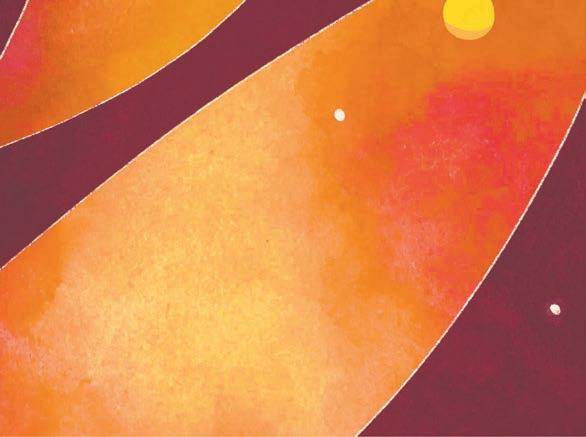


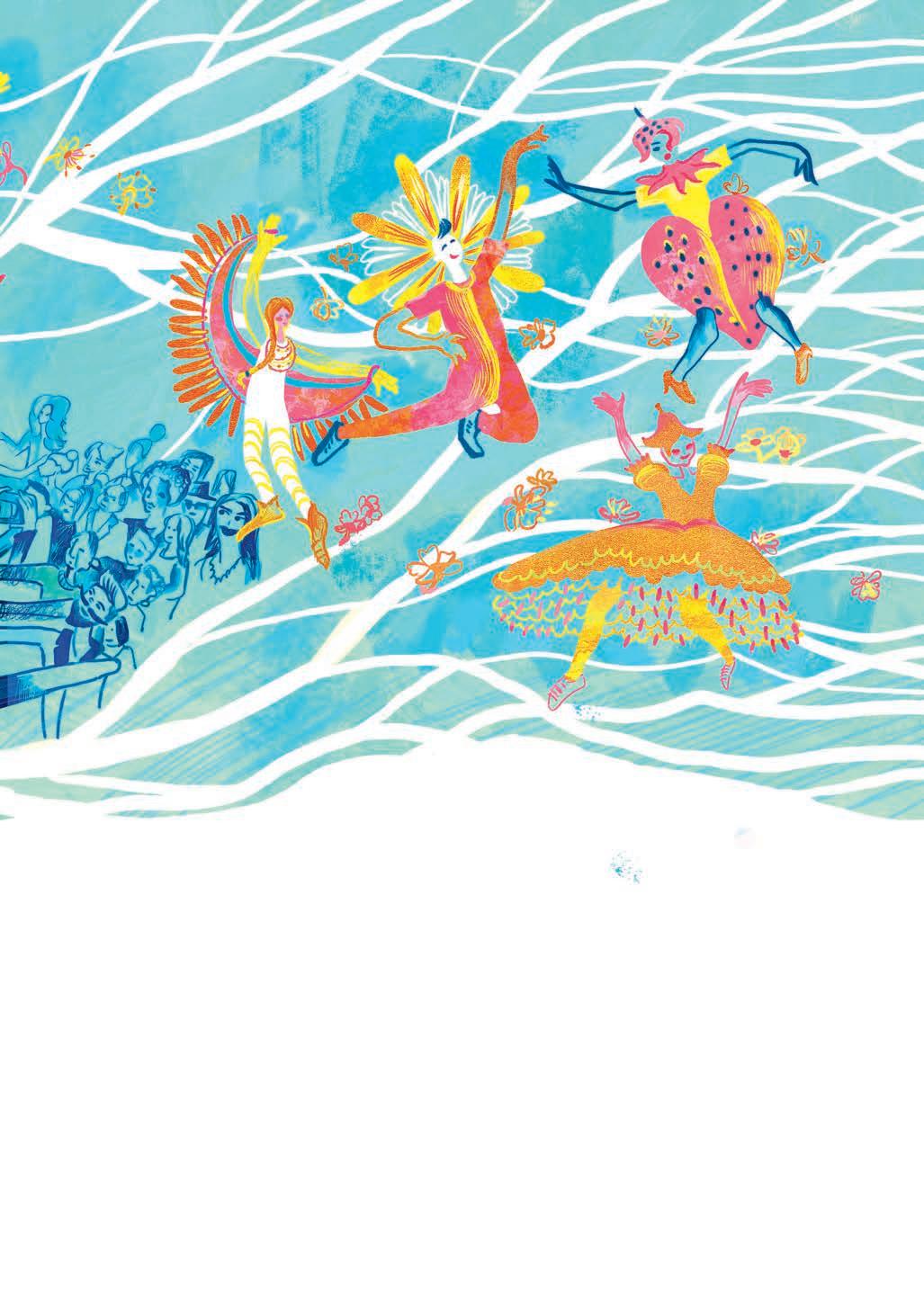
From the outside, it looks one of those red peppers Grandma cooks with. Aren’t they pre y much empty inside? It might not be too bad. But when Mrs. Foster guides me in with a tender shove, it feels more like I’ve been stu ed into my mother’s purse.
“Go on, dear. ere’s plenty of room in there for you and the drum.”
Just another lie designed to shoo o my enquiries. No use protesting. I’ve already pointed out in rehearsals that everyone else gets to run around, in crimson silk no less. Even Billy Joyce gets to be a blood cell. Every day we carry the same initials on our backs from lesson to lesson but somehow Billy is tolerated. According to multiple sources, this is because Billy has a good heart, whereas Mrs Foster has had to deal with me for weeks.
“You’re the star of the show, right at the centre of the action. And you get to beat the drum!
Won’t that be fun? You get to be in control. If you don’t beat that drum, the blood can’t move around. You’re at the front of the stage the whole time!”
Ah, the stench of mock enthusiasm.
“Let’s play the keeping-quiet-and-si ing-still game!”
“You’ll have two Christmases this year instead of one!”
So now I’m on stage, doing my thing. I beat the drum and think of my faraway father in his military parades. Wouldn’t he be proud? But Dad couldn’t see me, even if he were here. For I am the only person in the assembly who has been entombed. All of the other children can be seen, tearing around, singing their silly circulation song. Ma is somewhere out there and Tom of course, the older brother. When this is over the other parents will praise my performance, ru e my hair, sure, and then look at Tom, put their hands to their mouths, and gasp. Here, in their midst, stands a bona de future heartbreaker.
It’s ge ing very warm. Nobody warned me about the lights or the amount of people. e parents are taking photos. Some are actually recording this farce on their phones. But they can’t see the star, the leading man. ey won’t know it’s me! Everyone else will be in the lm. I’m being le out again. Meanwhile, the drum is ge ing louder and the rhythm has run away. My arms seem to have detached themselves from the rest of me but not in a good way, like the robot I was working on all last year. e one they con scated. I can just about make out the other children, although it is di cult to see anything through this livid, crepey skin. ey seem to be slowing down and ge ing in each other’s way. Without the regular beat, they don’t know what to do. ey have no clue, these children who get to stay in class, to move in herds, to huddle together in the yard. Who carry no initials on their backs. ey seem to have stopped now. ey are staring in my direction. All except Billy, who is enjoying running around too much to care. I told Mrs Foster Billy was a risk. Now I have their a ention, I’ll show them just how controlled I can be. I bring my arms to my sides. Steady. I grasp a drumstick and pierce the skin of the fake heart. is was never the right role for me. Ma must have had her doubts. It’s not the hyperactivity, it’s the meanness that gets me. e answering back. How could she or any of them possibly think I could play a heart? A sick joke on their part, surely. e drumstick punctures the layers of material with ease. e paper, the oaty fabrics, all easy prey. Mrs Foster’s stitches rupture with a pleasing popping sound. I push through and step out. Ta da! e other children are crying. Granted, I have ruined the illusion. But at least everyone can see me now.
“You’ve broken it!”
is is Milly Tiller, the girl who tried to talk to me. Once. How like Milly to help me like this. To nd just the right phrase. I start to chuckle as the blood cells traipse o stage, cursing my name. It doesn’t ma er about them. What ma ers is that everyone heard it. I am now a bona de heartbreaker.
“I am now a bonafide future heartbreaker. ”
I think of the herb called heartsease, remedy for my present pains I tell myself. I try to picture it then look it up in one of my old herbals. Gerard speaks of it
as having weak and tender stalks, its roots nothing but a bunch of ragged strings. I learn elsewhere it appears when earth is bruised by ploughing, that it can blossom
from May until autumn. Geo rey Grigson sca ers out its variant names like petals in the wind: wild pansy, heart’s delight, come and cuddle me, love in idleness.
I didn’t know what to think when Mum called and said Sunny had crawled into my bed. I was helping an old wholesaler from Ten Acres Farm when Abilene shouted, “Charlie, telephone!” I rolled the handcart to the man’s wagon, loaded three crates of corn and a cardboard box of sugarplums on back. He paid, and said, “See you next week, God willing.” en I hear that Sunny rings the doorbell, goes upstairs. Not feeling well, supposedly, but declines a glass of ginger ale. Mum says she can stay for supper, shuts the light.

Abilene was waiting on a crone who kept complaining about a recent sugarplum purchase. So, to skirt a scene, I made a sharp le up the cement ramp to the packinghouse, stepping past the peach machine and the loading dock. Inside the o ce sanctuary – a great escape – the a/c hummed as I claimed Grampa’s green leather chair to do an inventory check. With the weekend coming, we’d need twenty loaves of fruit bread, four boxes of cukes, a couple he y bags of Vidalia onions, a bushel of string beans, a bin of Supersweet corn, plus hot peppers, white eggplant, and the li le bear-jars of honey. I’d also dial Maribel at Hilltop Gardens and order po ed geraniums, zinnias, and impatiens. Leroy at the Watermelon Patch, too, was scheduled to drop o a bin of seedless tomorrow, around noon. As for the apple cider machine, I’d cleaned it spotless, lled it to the brim. I quit calculating the stock and started musing about a burger at the diner, but soon nixed that idea. Instead, at ve o’clock I’d tell Abilene I’ll be back, then tread the dirt road, like I’ve been doing all week. I’d leave the Pontiac parked under the elm tree and its glorious shade, all the while kicking stones on my way to the folks’. Maybe I’d see the great blue heron at the pond’s edge, and watch it glide. Whenever that bird aps its wings, I am breathless. e sight reminds me of a dinosaur bird . . . a pterodactyl. e phone rang again. Rings in the o ce, too. Abilene answers – or in the mornings it’s Raquel. I’m lucky two bright girls work on the market (my cousin or aunt are reliable alternates). Granny is the hirer. She’s the Boss.
Anyway, Sunny and I were shacked up on Maple Street, but by mid-March she began to protest that I wasn’t spending enough time, which probably is the major gripe in a billion relationships. Bo om line is I can’t watch sitcoms all day on Sunny’s couch, not until the season winds down.

By April I was arriving at her place later and later. en, in May, there was the spat about dirt tracks I’d le on her pristine white carpet. And last month, the clash about missing her best friend’s wedding. Which led to last week’s brouhaha, when I absentmindedly held a turkey-club on rye while updating the market inventory. A mortal sin, in Sunny’s book. She told me to toss it. I refused, said sorry, I didn’t bring it on purpose. en she grabbed it from my hands, and into the trash compactor it went.
Sunny was trying to mould me into the person she wanted me to be, which I resented. When we’d rst met, in the checkout line at the Kmart, the term “vegan” never struck my mind. I learned soon enough, though, on our rst date at Jenny’s Eatery. Me being polite, I ordered a tame dish instead of grilled chicken and a tall glass of milk. As our relationship intensi ed and I moved in at her place, I wondered why I always was the one who had to adapt. I mean, why dance around the meat milk, the milk? Maybe I could sneak ve strips of bacon on Sundays, with a side of eggs. Or indulge a burger now and then (a real burger, not a phony veggie-thing at the Green Leaf Café). And, look, nobody’s gonna tell me I can’t drink a glass of milk, or bu er a slice of bread!
I stepped out of the o ce and took another ramp, to the cold storage. I pulled the dangly cord and voilà: the metal doors sprung open. Inside the freezing cavern, I surveyed the skids of yesterday a ernoon’s packed peaches: the Early Red Haven variety. A truck from the city would come down for the pickup. I hope it’s a decent summer with the right amount of rain, and no hail, hurricane, or other natural disaster. Luckily we’d survived that May fourteenth frost – the pink blooms, in this part of town, at least, didn’t sustain much damage. Grampa always said you can’t beat Mother Nature. He’d never stay up all night, eyeing the thermometer if the weatherman had issued a frost warning. Other farmers sometimes hired pilots to hover helicopters above their crops, through the wee hours, circulating warmish air currents, a desperate, costly endeavor that rarely, if ever, defeated the frost. Whereas all Grampa did was hit the sack at eight pm and rise at his usual ungodly hour, then go to work.
I le the cooler and returned to the roadside market. Abilene’s a talker – a jibber-jabberer. Granny likes her because she’s sweet with the customers, crones included. Raquel is a close second. And both are trustworthy with the cash box (most important! says Granny.) Since Abilene is bright, and one day might be CEO of a world-wide company, I occasionally seek her advice. So I dragged a stool to the counter while she sorted the stone-green tomatoes, pyramiding them onto the yellow Styrofoam tills.
“Hey, Abby. Quick question: do you eat meat?”
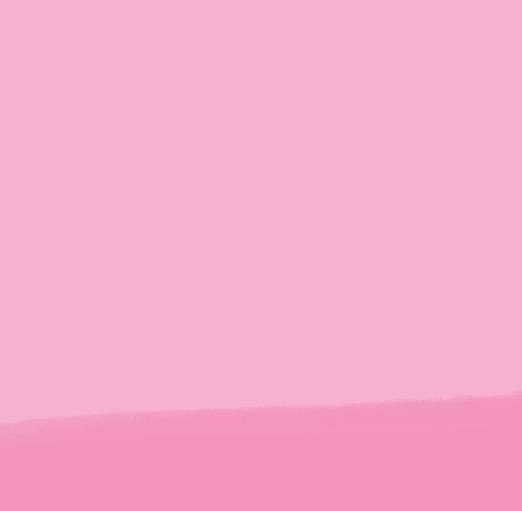

“What?” She laughed.
“Meat. Just a question.”

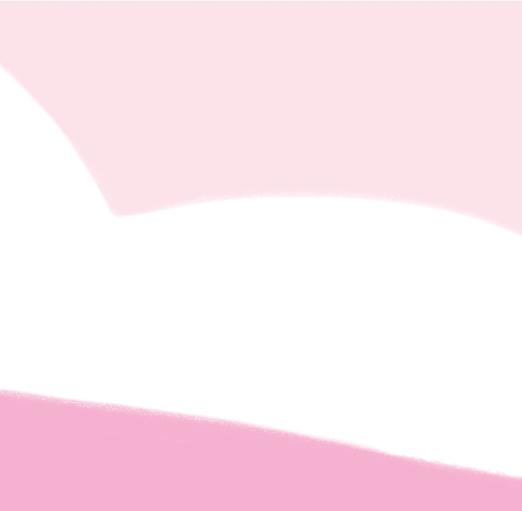

“Yes,” she said, a bit ummoxed. “Never seen me have a sandwich?”
“Not a roast beef or a turkey-club, not a burger.”
“I make a ham-and-cheese sometimes, but mostly keep a strict diet.”
“Okay, say you marry a vegan – a hypothetical. And if you ate ham, cheese, eggs, turkey, or God forbid had a glass of milk, he’d throw a t, curse you out.”
“ at’s crazy!” she clucked. “I’d never marry someone like that!” She transferred the tills

to
“I thought she might leap out my bedroom window. ”
the display bench out front.
I added the empty basket to the Leaning Tower of Pisa behind me. “Well, say you tie the knot. Would you . . . adapt?”
“Maybe if he was handsome, successful . . .”
“ ose’re the requirements?”


“It’d depend.”
“On what?”
“If I knew from the beginning that he’s health-conscious, then I’d be forewarned. But if he switched – converted – that’s di erent.”
A car braked in the drive. An ancient couple in matching brown plaid slowly opened their doors, and exited. “Look at these two lovebirds,” Abilene said, beaming.

On the pike, I saw a trailer truck coasting down the hill, blinker ashing. “A er I load the skids, I’ll head to the house. Take some tomatoes home tonight, don’t forget.”
“I will. anks, Charlie!”
*
I scribbled the bill, waved adios to the driver, and jumped o the loading dock. Too bad the heron wasn’t around. Maybe Sunny’s right: Could I sink my teeth into heron meat, amingo meat? I’ve yet to touch ostrich or bu alo meat, or shrimp, for that ma er. And as for poor lobsters, cooked alive? No way! Hmm, I wonder what the heron eats for supper? Fish, frogs, eels, snakes . . .
I was curious about the visit. Why enter my room with the fading posters of Van Halen, Def Leppard, and Quiet Riot tacked to the walls? Technically, we were in limbo: a week’s a week. e yellow Volkswagen – the Sunshine mobile – sat parked in front of the garage, next to the bu er y bushes and petunias. Either she’s upstairs, or at the table.
I brushed my boots on the mat. And, uh-oh . . . it smelled like a steakhouse! Mum in Friday mode! I’d forgo en the Friday-meal tradition. Dad’s a T-bone lover, like me. Only I hadn’t had a steak since my stay with Sunny. For a second I thought she might leap out my bedroom window.
I greeted Dad, asked if he’d seen her.
“Nope,” he said, as Mum handed him a sizzling, honey-citrus spiced plate.
Mum asked, “What are you and Sunny doing?”
“She hates meat, remember?”
“Oh darn, I forgot!”
“It’s T-bone Day at the Ackermans,” proclaimed Dad, cu ing a piece of steak.
Mum, worried, said, “I’d have made beans and macaroni, or noodles and –”


“Alice,” Dad interrupted, smiling and chewing. “Bring her down, Charlie.”
“She really hates meat,” I reiterated.
Dad nodded, winked. He li ed the bu ered corn on the cob to his mouth, and took a hearty bite.
*

Sunny was curled like a li le girl under the blue-pa erned bedcover, and matching sheets. I sat quietly at my desk, rather than disturb her. And, I thought, How brave to pay a visit, on a Friday. ere’s hope yet, a er all.
As the minutes ticked by, I let her sleep . . .

 by Helen Jarosz
by Helen Jarosz
I fantasized about watching the event roll out like an Oscars pre-show: people dolled up in their Sunday best saying things like Marcus would have loved this, or that’s too cheerful, or do we have to go? e Dodgers game is on, but I’ve fast-forwarded straight to the boring part.
My father is holding his wife’s hand as she feigns tears and nuzzles into his shoulder, her ivory makeup smeared all over his black bu on-down. My best friend Johnny, visibly drunk, waltzes up to the front of the service to make a speech. He stumbles into my face, which is blown up on a sixteen by twenty-four-inch framed poster and raises his beer bo le in salute. Ursula is picking at her nails, crossing and uncrossing her legs nervously as she waits for Johnny, who she has always hated, to say something stupid. My brother is in the cemetery ge ing stoned.
As Johnny nishes his speech, leaving my funeral a endees even more perplexed than when they arrived, a slight wind creeps through the trees. I pluck a weed from the grass and blow on it. As the li le white polyps dri through the crisp autumn air, I try to think of a wish. I used to wish for death – what now? I may be stuck in purgatory, but once that casket sinks into the ground, I’m certain I’ll be released. And I’ll rise like a phoenix into the heavens.
*
Everything feels strange and fuzzy, like that lm over your teeth when you wake from a long night of benzo-induced sleep. Like I’m in some nightgown dream world. I’ve been entertaining myself by doing things I haven’t done in years, things I used to enjoy. Before the bedsores, the endless days of masturbation. Before I’d order in for every meal and forget what day it was, the kitchen trash piling up because I was too weak to face the bald, bleached out days of Glassell Park.
On my rst day as an in-between, or ghost if you’re superstitious, I wandered around Gri th Observatory. Tourists took sel es with James Dean’s bronze head on a pillar. A vagrant drank from a shiny silver ask and cursed at a rabid coyote as a runner swooshed past, her face red and glistening. A young man stood motionless in the queue, staring into his phone as if it were an oracle as I gazed through the telescopes at the endless Tetris blocks of tract homes, downtown buildings glaring with morning light, the pools of rich people’s houses like Hockney paintings in the distance. e purple sky lightened into a pallid, pewter blue; the lines of smog illuminated like a halo. So many dreams thrum in this forgo en city. Sometimes I feel like I can touch them.
A er a few days, I began to feel an insurmountable guilt project from my stomach into my throat. Who was I to take myself out of this world prematurely? is world, with so many li le deaths; what if my rebirth was just around the corner? I started to think of Ursula, the only person who could console me during one of my depressive revelations. Which got me thinking...where the hell was she, and why hadn’t I paid her a visit?
I was sure Ursula would be beside herself, but when I came up with the brilliant idea of haunting her apartment, she was riding another dude like Khaleesi rides those dragons in Game of rones. At rst I couldn’t believe my eyes, but then I realised it must have been her twisted way of coping with my death. I wish she could have seen me watching her. She’d have smiled. at was my favourite thing about her, her smile. It was big and sweet and brightened her whole face and pre y much the entire universe. Everyone in the room would fall in love with her if she smiled. So she ashed those things only at the worthy.
Urs and I rst met at a restaurant she waitressed at in Franklin Village. I’d been si ing at a booth with Johnny, who was face-deep in a double cheeseburger, when she started screaming at a customer because he asked for an extra side of ranch dressing. at was the moment I knew I wanted to make her my wife.
But a er she miscarried last year, she said she didn’t want to get married anymore. Something about fate, how you have to take certain things as signs.

*
Weighed down by existential and emotional exhaustion, I headed to the house where my brother Bruce and I used to live together on Saxon Drive. He was gaming of course, his room li ered with empty bo les of Mountain Dew, half-eaten bags of potato chips, crusted dinner plates, candles with wax dripping down the sides. ere he sat, thriving in his lair, one of the only places he ever felt comfortable. Where he was king. Why hadn’t I ever gone into his room, sat on his couch, asked him how his day was? As I watched him jerk the controller from le to right, it reminded me of when we’d play Nintendo as kids. Our favourite game was Super Mario Brothers with that dinosaur Yoshi and that fat bastard Bowser. Back when we were bright-eyed, sweet with innocence, like a birthday cake that hadn’t been sliced into yet.
Suddenly he paused the game and set the controller down gently, as if it were something living. He took a deep rip from his bong. As smoke plumed around his face, he took on a sense of immortality, like an archangel. He walked through the haze over to the closet and pulled out a couple of old photo albums. As he lowered himself onto the bed and thumbed through the pages, he let out a prolonged fart, at rst sounding like a balloon releasing air, then slowly transgressing into a haunting, silent missile. I was grateful I’d lost my sense of smell. ere was a photo of me in my football uniform, the only game they let me play the entire season, before I realised I hated sports. A blurred photo of my brother, baby faced, shotgunning a beer. He’d run into the bathroom shortly a er and puked. It was good training. A photo of me and my ex-girlfriend Sharon, with her bright burgundy dreads that smelled of hemp and patchouli. en, a perfectly saturated, perfectly exposed photograph of my family and I, all together at graduation. Before Mum and Dad divorced. We looked happy. So, why did I do it? I mean, I wasn’t exactly in the right state of mind. I’d been on a misery streak due to Ursula sha ering my heart into pieces with unabandoned, ruthless precision.
“It was her twisted way of coping with my death.”
She and I had always loved the nal scene in Wim Wenders’ e Million Dollar Hotel where Milla Jovovich’s character runs in slow motion in that lilac dress at dawn as Tom Tom takes a swan dive to his death. I guess I wanted to show her I wasn’t a pussy. But as much as I longed to reenact that scene, I also always wanted to go out in the comfort of my grandfather’s Buick Regal. My baby. I contemplated driving it o a cli in Oxnard but decided that would be too dramatic. So I did it the old-fashioned way. I don’t’ think anyone would have noticed had the Amazon delivery guy not reported the smell coming from the garage.
*
My mum has now o cially lost it and is bawling. She’s blo ing her spidery mascara tears with a handkerchief. ere is resentment buried beneath her sorrow, just breaching the surface. I start to feel like I’ve done something I maybe can’t reverse. As I walk to the back of the service, I spot my Uncle Jed scratching the bald spot on the top of his head, his lip fat with tobacco. My brother waltzes up to the back row and startles me. He’s so high his irises are a di erent shade of green. I imagine everyone can smell the weed, because a couple rednecks I don’t even recognise start sni ng the air like deranged housecats.

Funerals are depressing, but the narcissist in me enjoys watching others commemorate my short existence. It’s fascinating to watch their true colours surface. For instance, Marianne, who I used to consider one of my closest friends, hardly looks phased. She almost looks happy or at peace when she removes her oversized sunglasses. She was always kind of a bitch, and instantly took Ursula’s side a er our breakup. As if it were my fault, as it if were anyone’s fault our son died inside her. On the other hand, my sponsor, Murray, is beside himself. Poor guy. I was constantly disappointing him with my relapses, which might have been the reason he grew so a ached to me. Maybe he enjoyed the volatile ride of my failing life. Maybe it felt like a drug to him.
Murray walks over to Ursula and whispers something in her ear. He places his hand gently on her knee, which I know is so as grace. Ursula nally starts to crack, her eyes watery like a lake. She and I used to have Murray over for dinner every week during the good days. We’d make pasta, talk about our past lives, then Urs and I would go upstairs and fuck gently while Murray watched HBO in our living room because he didn’t have a TV at his house. Sometimes we’d wake to him sprawled out on our couch the next morning, his long legs hanging over the arm rests like a supine animal, and we’d all go out for co ee. We were like a li le family.
*
e time has nally come. Everyone makes their way to the casket, the sadness exalted in their slow, saturnine gaits, the pouty glances they exchange, the way they look up at the sky as if searching for me. I’m right here guys! But nobody will ever know. Nobody will understand what it’s like to walk the earth as a whisper, a shadow, a secret. Yet I’ve peered into their lives behind doors slammed shut, and although it’s elicited some resentment and disgust, I’ve fallen a li le more in love with every person here. My family, my friends, my enemies, my people.
e sun begins its descent into the palms, their faces cast in rose-gold light. I can hear the gentle heaves of their breath as if I’m inside a womb. As if I’m being born for the rst time.
For a moment, it is almost beautiful.
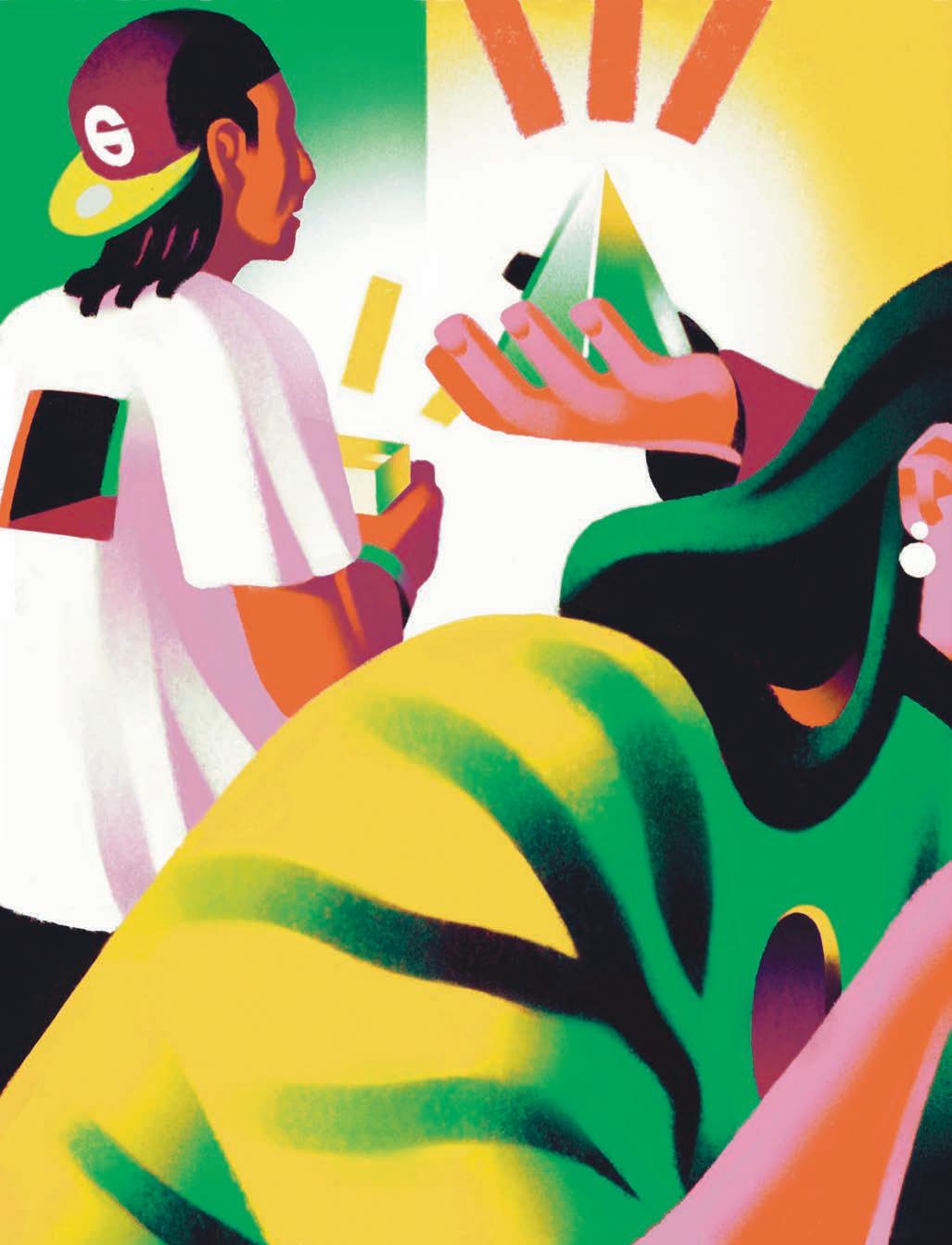
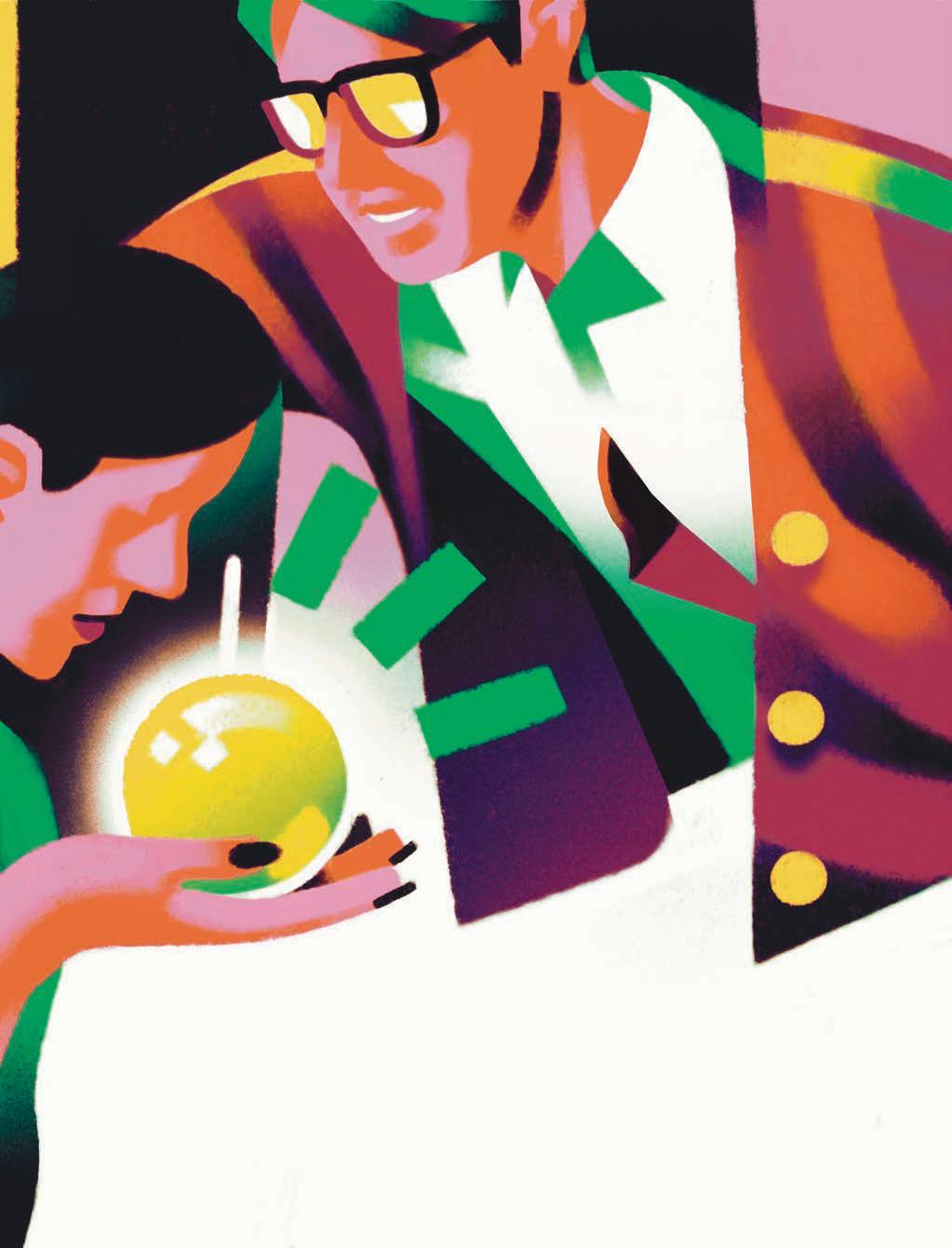


 HEART | Illustration by Davide Spelta
HEART | Illustration by Davide Spelta
“If it is true that there are as many minds as there are heads, then there are as many kinds of love as there are hearts.”
– Leo Tolstoy, Anna Karenina
8 – Skye Fulcher has made up quite a few stories but has a habit of not showing them to people. Her works include poetry, non- ction and short stories. She lives in Canterbury, Kent, UK.

10 – Mantz Yorke lives in Manchester, England. He is widely published in magazines and anthologies, and he has had two poetry collections published by Dempsey and Windle.
12 – Mike Wilson is author of Arranging Deck Chairs on the Titanic, (Rabbit House Press, 2020), political poetry for a post-truth world. He lives in Lexington, Kentucky, USA.
18 – Reema Rao-Patel is an Indian American writer from Chicago, USA. Widely published, she was longlisted for e Masters Review 2022 Summer Short Story Award.
20 – Kevin Jared Hosein is an award-winning Caribbean short story writer, poet and novelist. In 2018 he won the Commonwealth Short Story Prize. Hungry Ghosts (Bloomsbury) is out now.
26 – Charlo e Johnson works as a research development manager and writes poetry in her spare time, sometimes with the poetry collective Open Cast. She is based in Reading, UK.
28 – Joel Scarfe is a widely published writer. His poems feature internationally in magazines, anthologies and periodicals. He lives in Bristol, UK, with his partner and their two children.
30 – Lauren Woods has been widely published in journals. In 2022 she was shortlisted for e Forge Literary Magazine’s CNF prize and Best of the Net. She lives in Washington DC, USA.
35 – Les Bernstein has had three chapbooks published by Finishing Line Press and her book Loose Magic is out now. She won the Nazim Hikmet Award and is a Pushcart Prize Nominee.
36 – Nicole Chvatal writes property deeds and other wi y things in Bath, Maine, USA. She has been widely published and is a graduate of the Warren Wilson College MFA for writers.
38 – Emma Robertson is a dance tutor and writer from London, UK. She was longlisted by the Bath Flash Fiction Award and has been widely published in literary magazines and journals.
41 – Hope Wandless, 20, is in her nal year studying animal conservation science in the Lake District, UK. She fell in love with poetry when she discovered Sylvia Plath and Carol Ann Du y.
42 – Rosebud Ben-Oni is the winner of 2019 Alice James Award for If is Is the Age We End Discovery (March 2021), and was a nalist for the 2021 National Jewish Book Award in Poetry.
46 – Scampy Spiro is a UK-based writer and selfconfessed rat fancier who claims a fascination for the narratives that lie between the cracks of faded Polaroids and nostalgic advertising.
50 – Neil Laurenson is a Worcester-based poet who has appeared at Cheltenham Poetry Festival and Hit the Ode, among others. His debut pamphlet is published by Silhoue e Press.
52 – David Brookes is a UK-based writer who runs editing rm e STP Literary Service. His rst novel Half Discovered Wings was published by Libros International in 2009.
56 – Suzy Aspell is a widely published writer who performs regularly at York and Ooh Beehive Open Mic Sessions. She has lived in Spain and Taiwan, but currently lives in Luton, UK.
58 – Allan Miller has had short stories featured in Gu er, Porridge, Noctivagant, e Martello, Mono and others. He also writes award-winning television scripts for BBC and Channel 4.
60 – Clara Berut-Lhopital is a French writer living between the French countryside and London, UK. She hosts occasional writing circles at her website atriparoundthewords.com.
62 – Emmaline O’Dowd is an ex-music teacher who lives in Derby, UK. Her writing has been published in Acumen, Orbis, Pennine Platform and e Alchemy Spoon among others.
64 – T L Ransome is a Pushcart Prize nominee who has been shortlisted for the Bridport Prize, longlisted in the WriteWords Competition, the Cambridge Prize, and in Re ex Fiction.
66 – Rachel Lister lives in the North East of England, where she teaches and writes. Her stories have been published in Mslexia, ema, Spelk, Fewer than 500 and 200-Word Story
69 – Ciarán Parkes lives in Galway, Ireland. His poems have been published in e Rialto, e reepenny Review, Autumn Sky Poetry Daily. Heartsease was wri en during lockdown.
70 – John T Ba aglia is based in southern New Jersey, USA. He is an alumnus of Rowan University and a ended Lee Strasberg eatre Institute in New York.
74 – Jenna Putnam is a writer and visual artist based in New York and California. Her work has been featured in Autre, e Sun, e Moth, ExPat Press, e New York Times, and others.
We showcase vivid writing by the literary new blood.
Each quarter we announce a new theme for the magazine. Details about our theme for the next issue will already be available on our website.
Find out more about how to submit and sign up to the mailing list to be the first to hear news about the journal, themes and calls for entry.
popshotpopshot.com
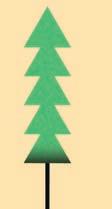
Alissa aler alissathaler.com
Bethany Jayne Studio bethanyjaynestudio.com
Carmen Dominguez carmensitailustra.tumblr.com
Catherine Byun catherinebyun.com
Chiara Morra Insta @chiaramorra
Darren Espin darren-espin.co.uk
Davide Spelta davidespelta.com
Elena Wong atelierhu.com
Elisabeth eo elisabeththeo.studio
Ginger Ngo gingerngo.com
Helen Jarosz behance.net/helenjarosz1
Joyce Cho artbyjoy.net
Kalakal kalakal-illustration.com
Karolin Schnoor karolinschnoor.co.uk
Katie Coward katiecowardillustration.com
Margot Szipszky margotadele.com
Martyna Grądziel martynagradziel.com
Milena Muszynska Insta @milmuszynska
Mya Hang myahang.com Poppy Loughtman poppyloughtman.com

Sophie and e Frogs sophieandthe ogs.com
Tayla de Beer tayladebeer.com Tim Alexander hellotimalexander.co.uk
Tímea Terenyei timeaso a.com

Varvara Temnichenko varvara-illustrator.com
Yvonne Redin Insta @yvonneredin
The beautiful illustrations that make Popshot really pop are produced by a team of creatives every issue.
If you’d like your illustrations to appear in the magazine please get in touch with a link to your portfolio.
illustration@popshotpopshot.com

























